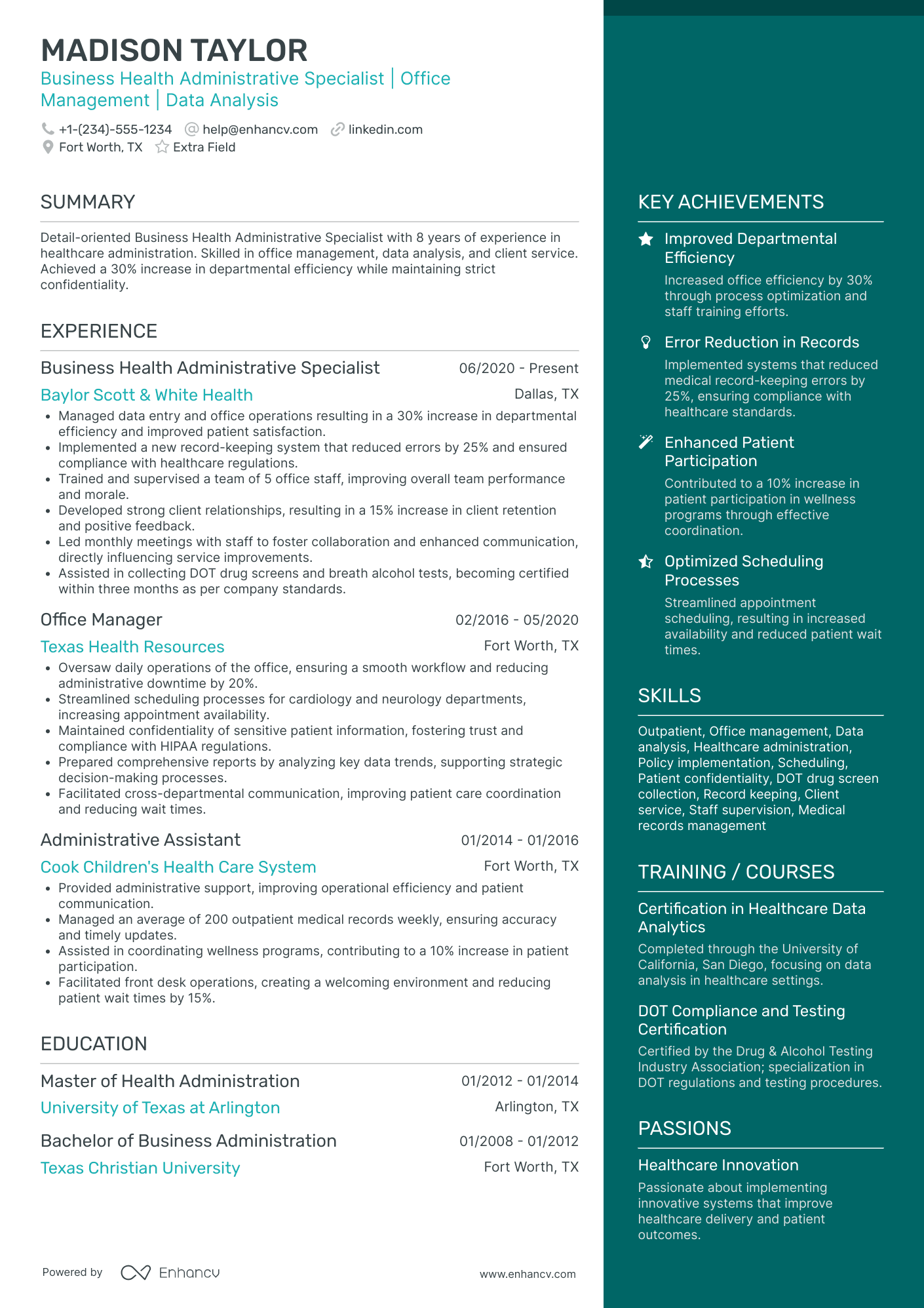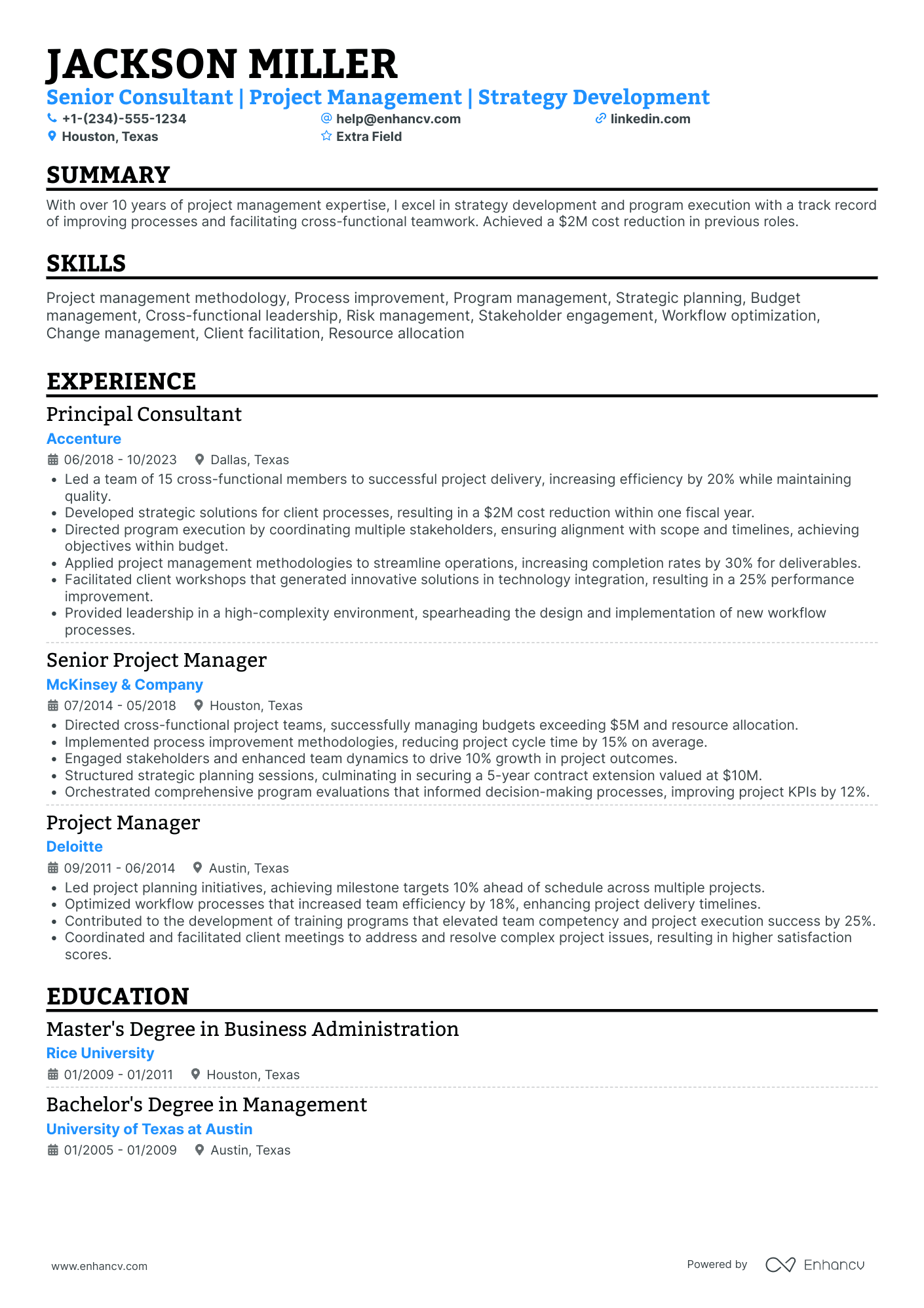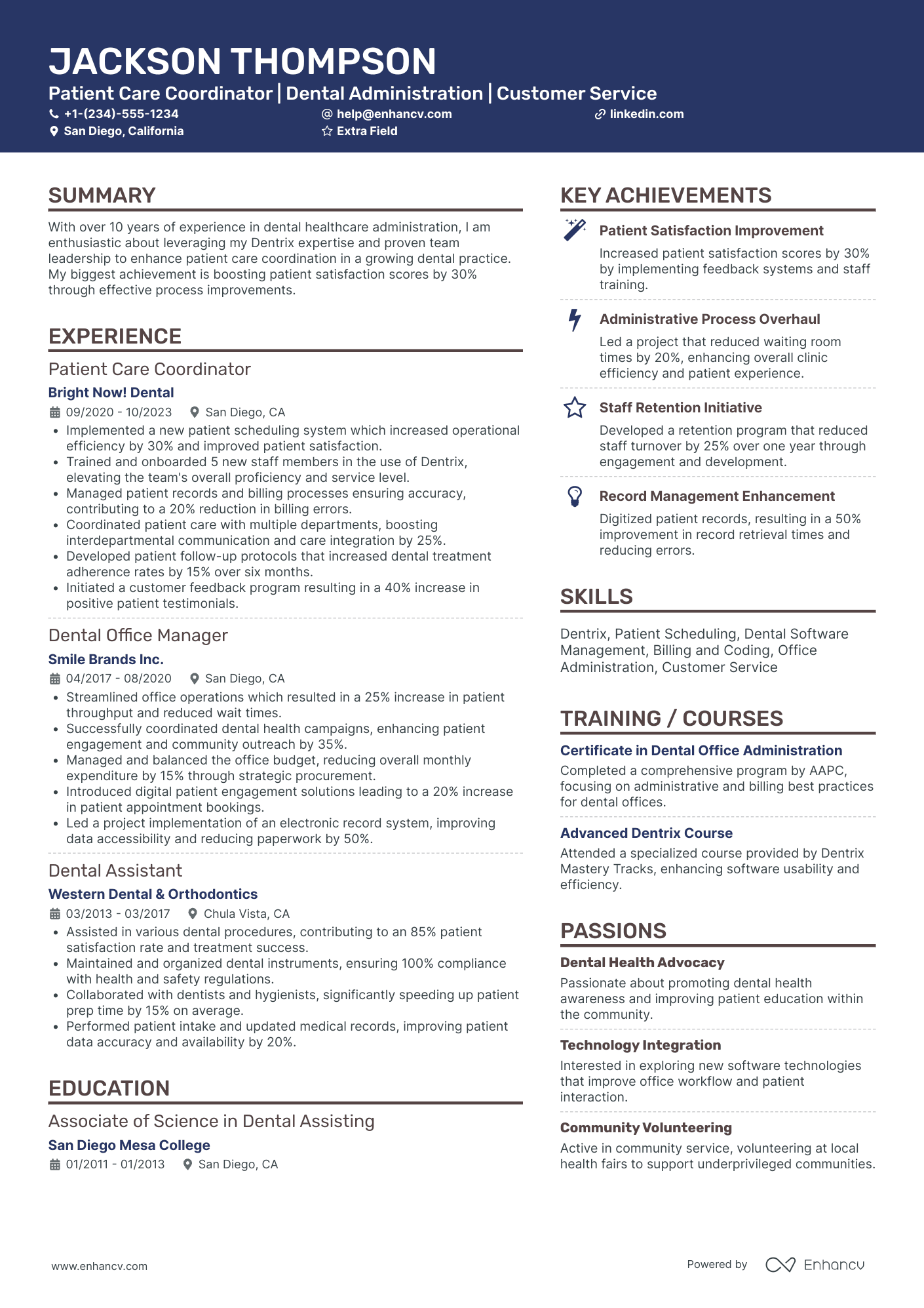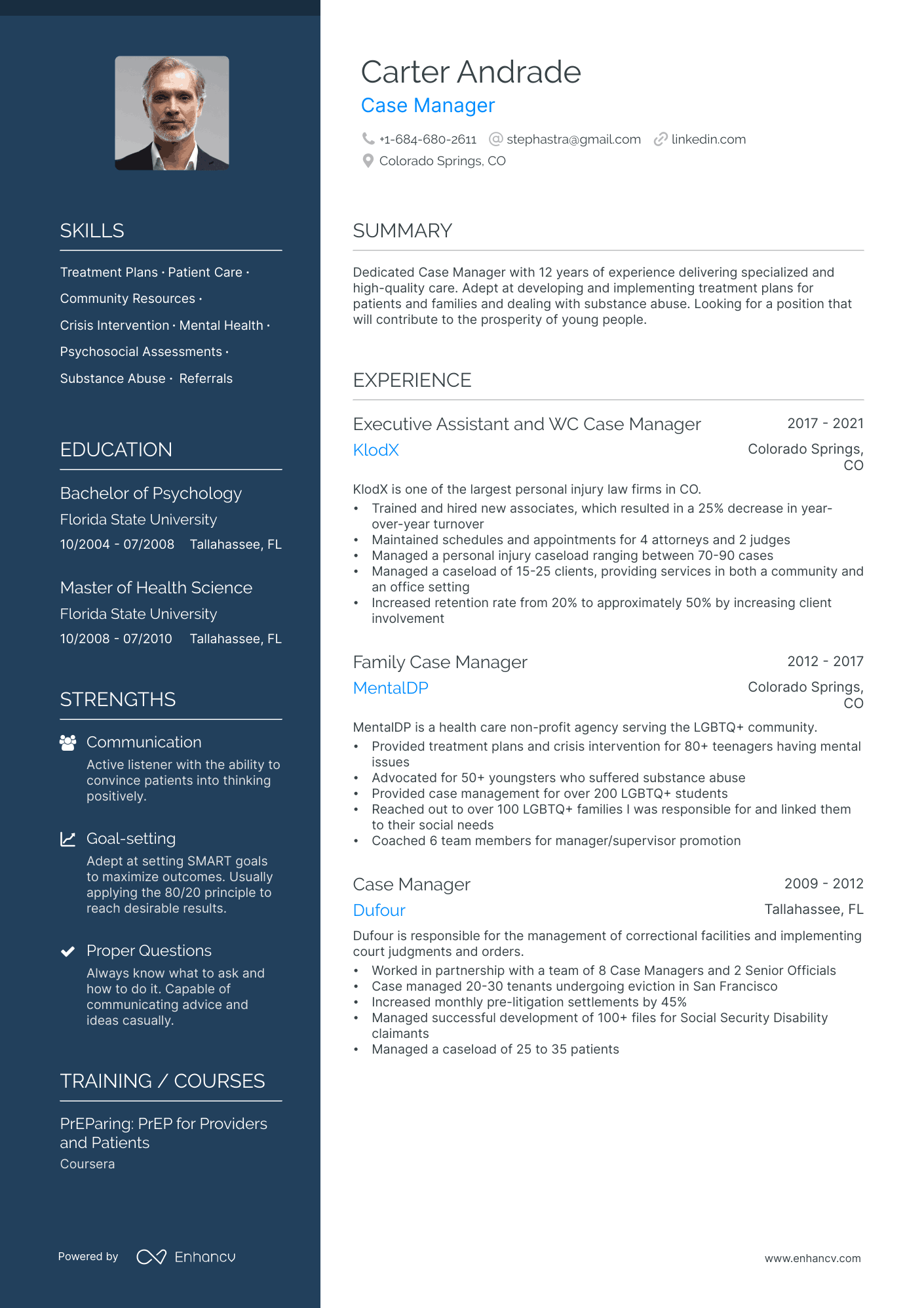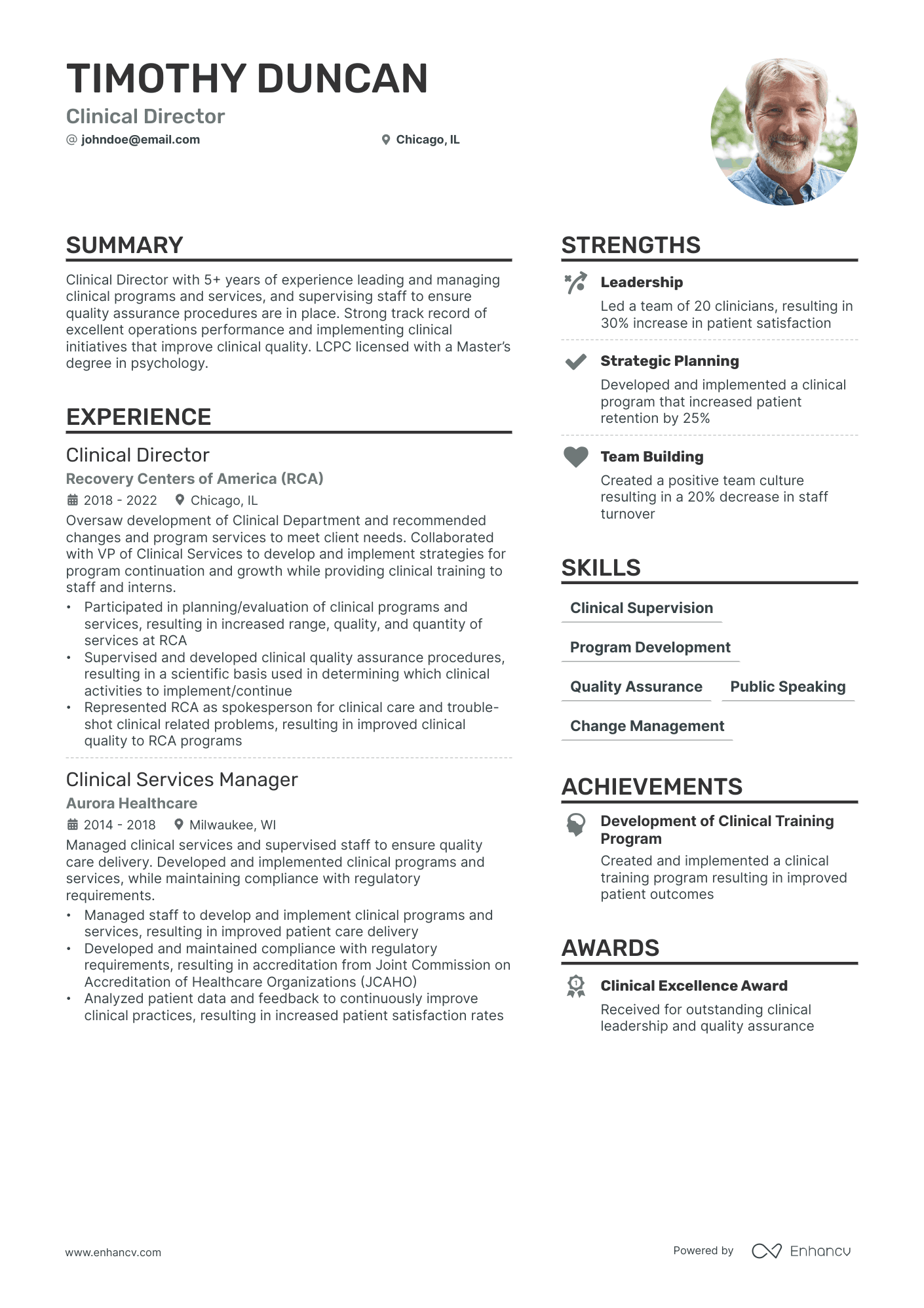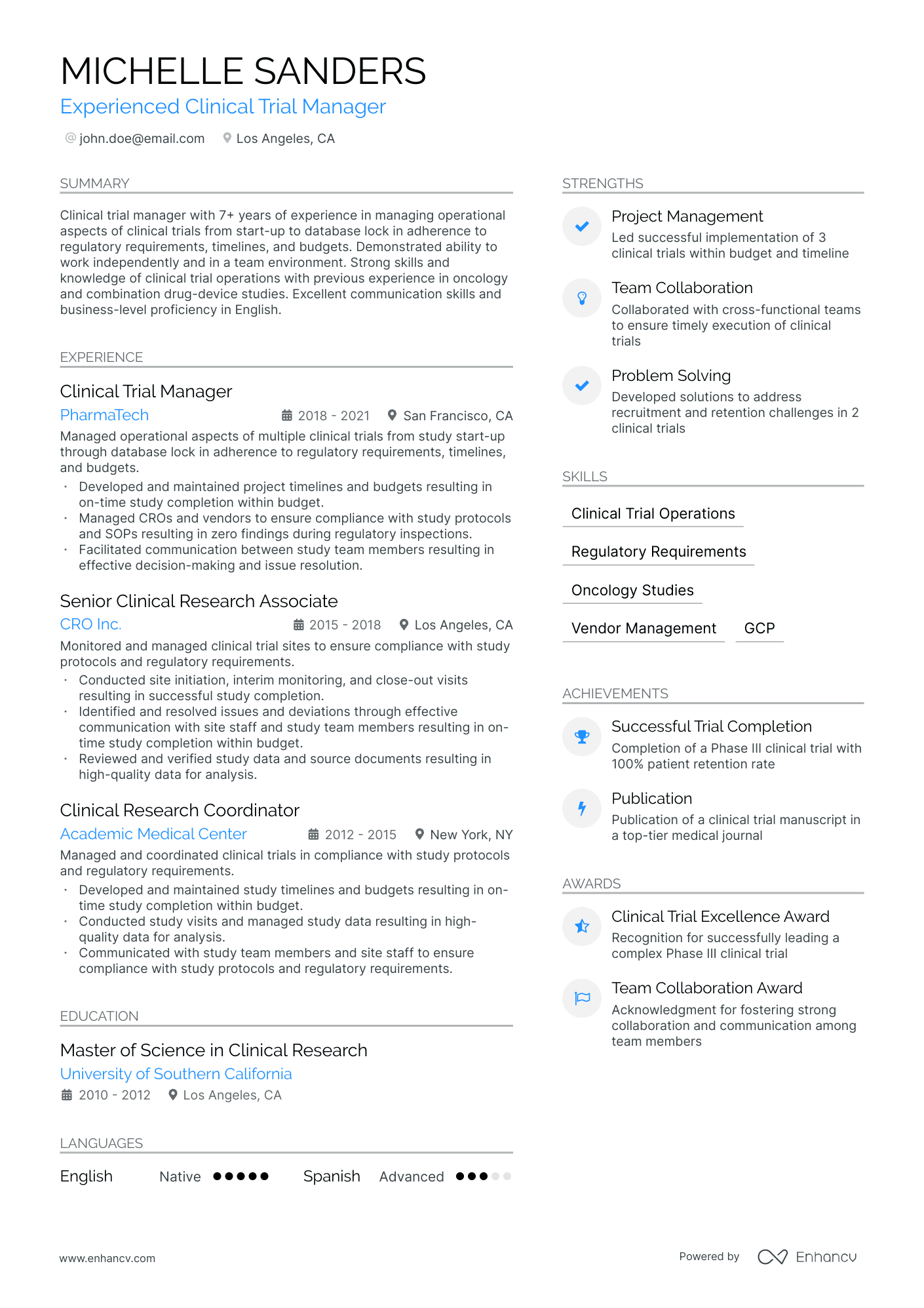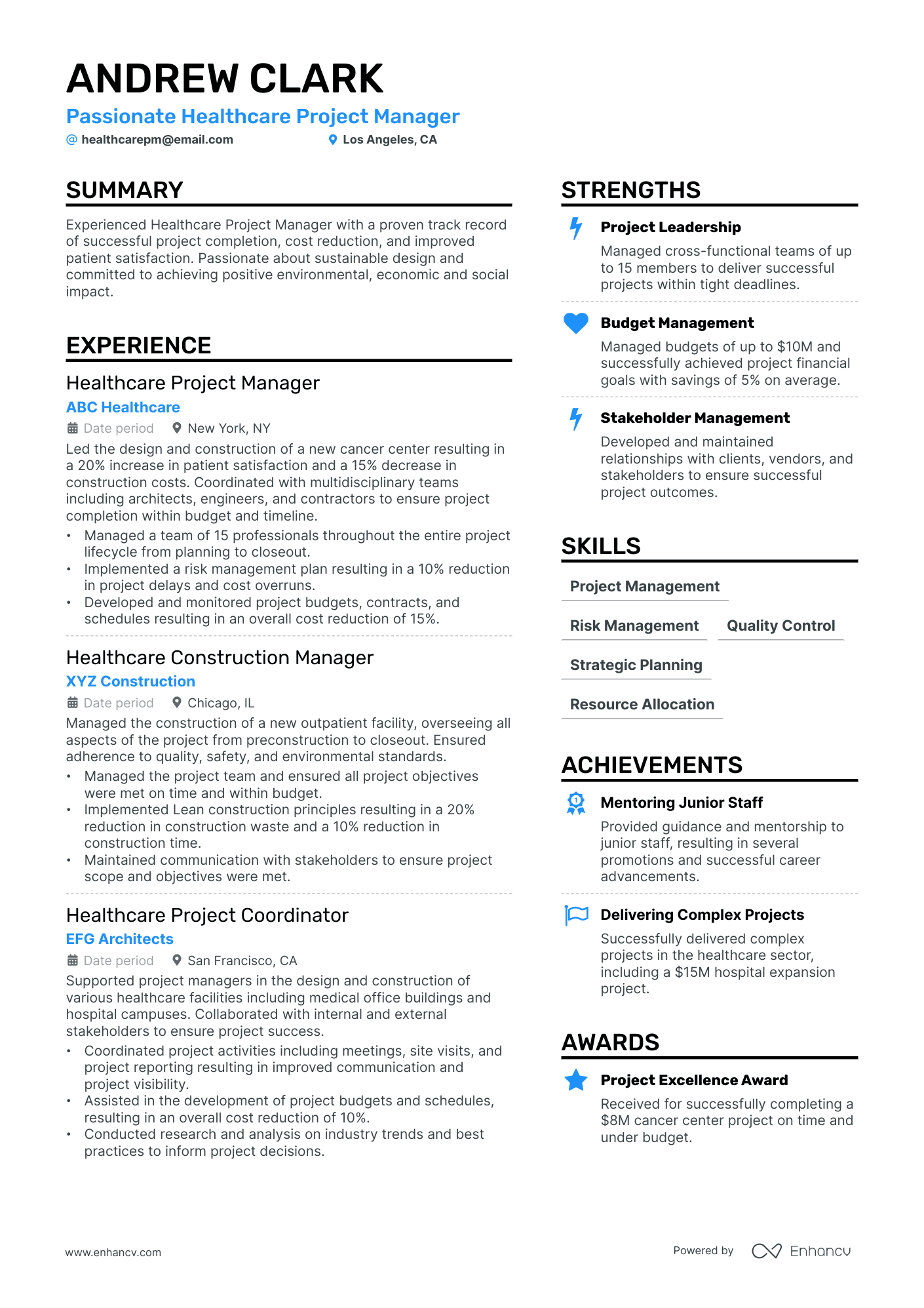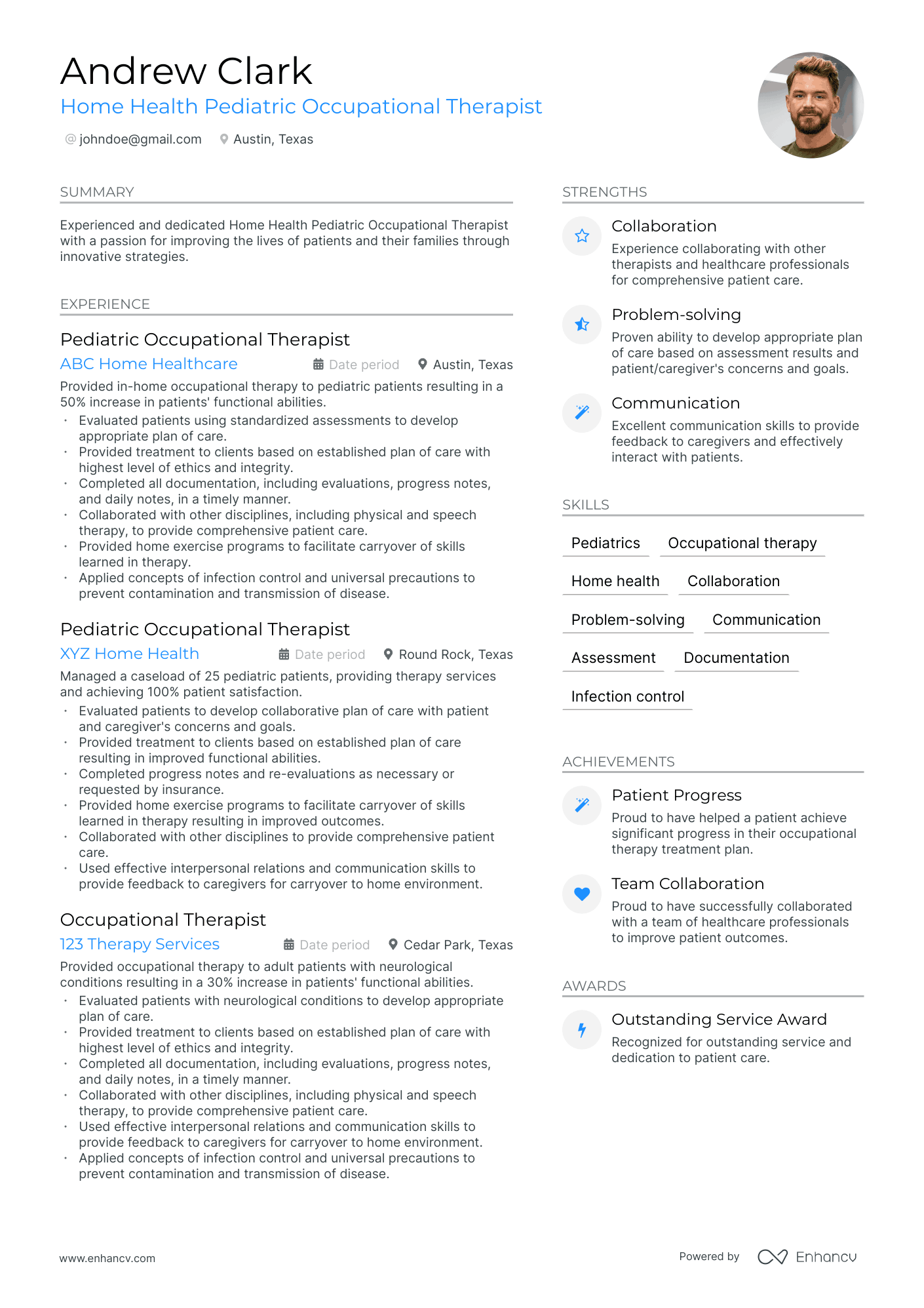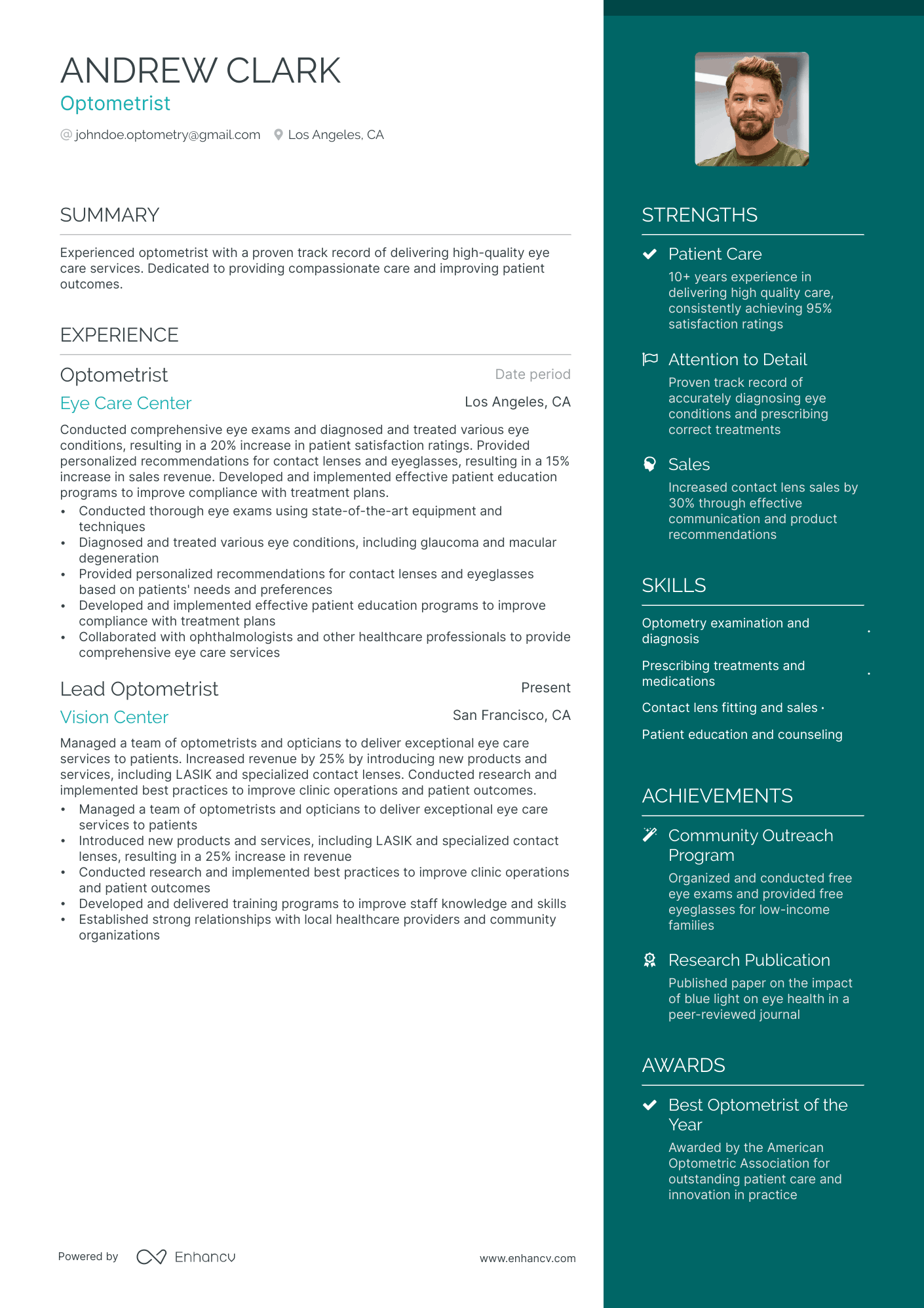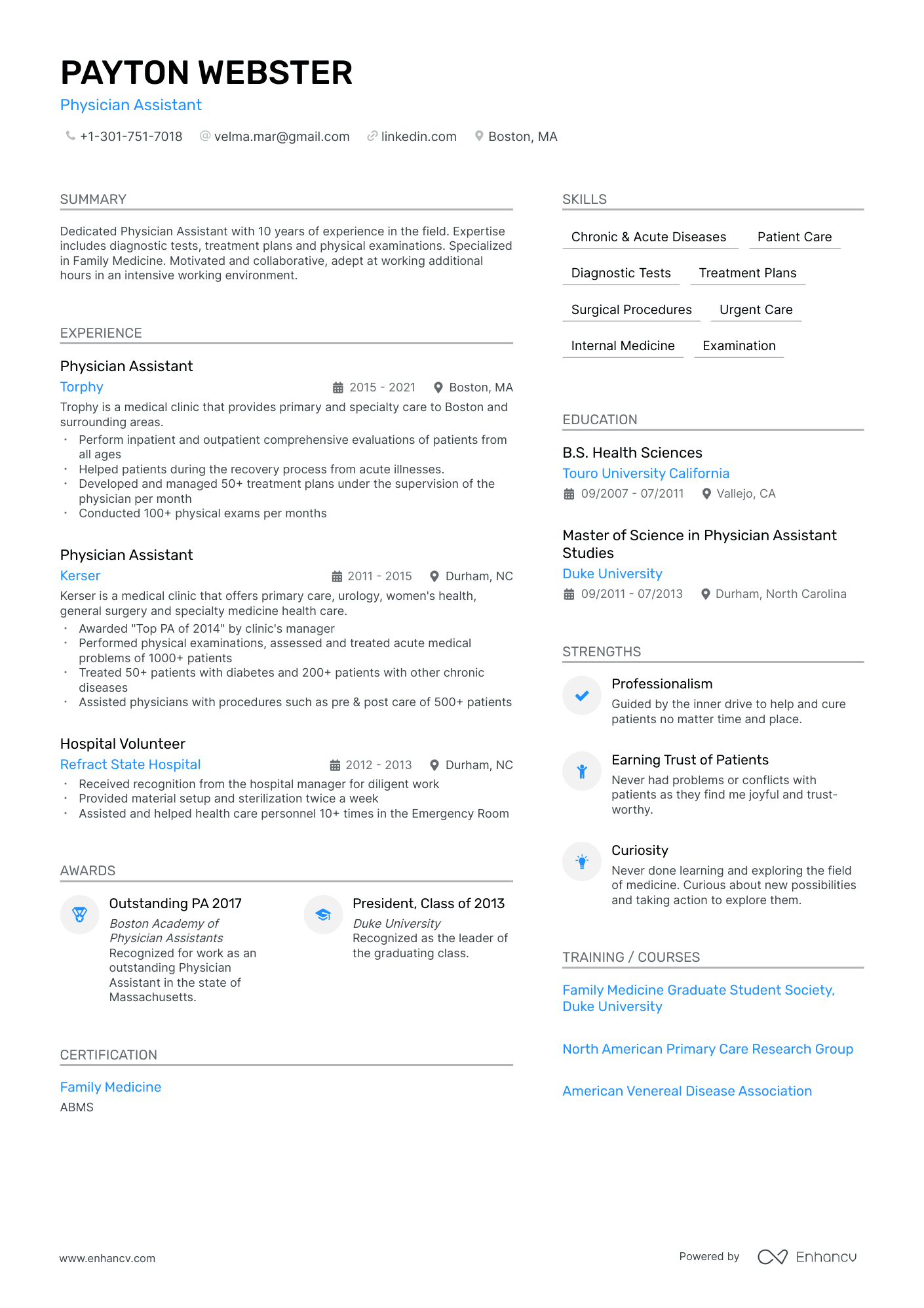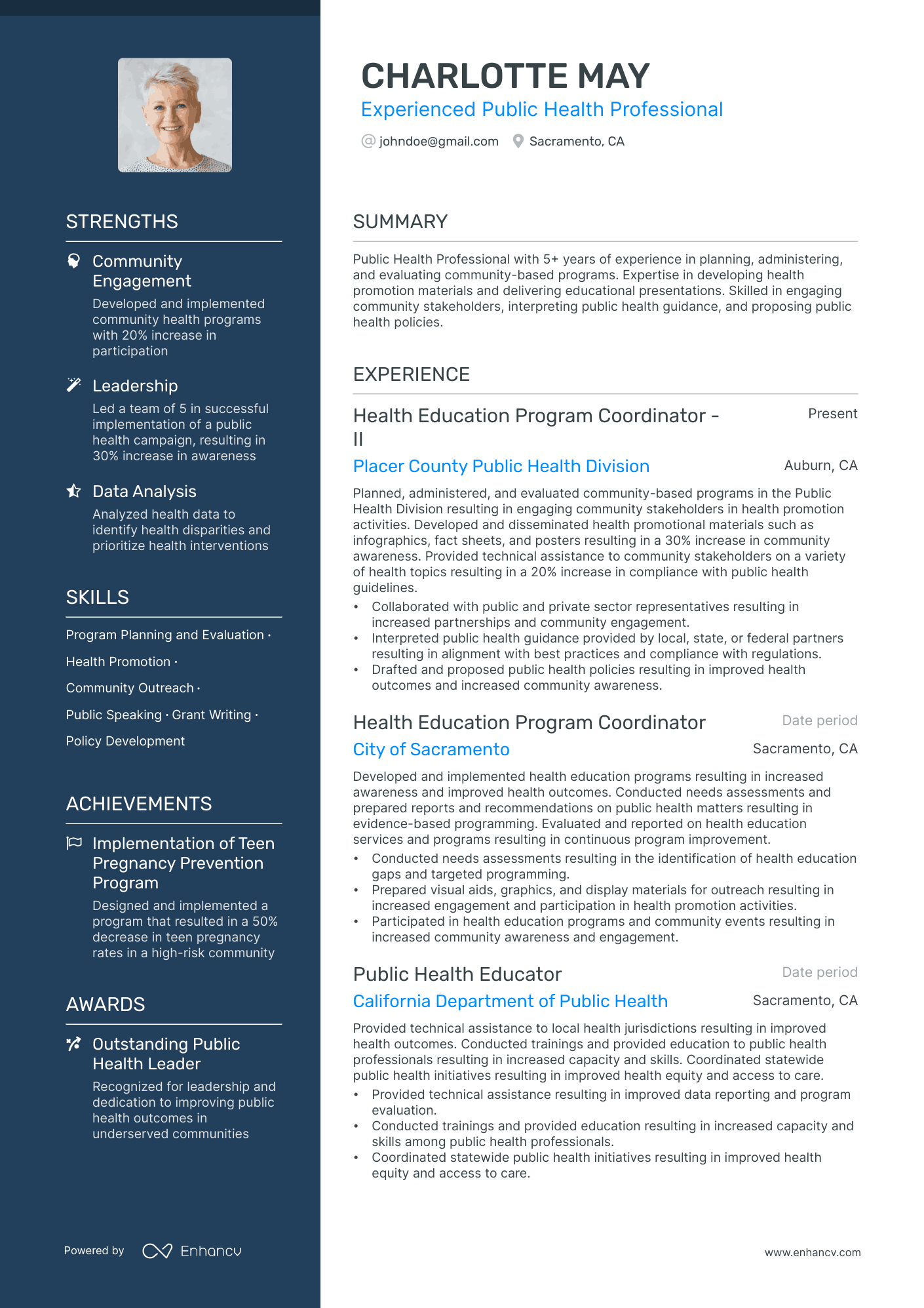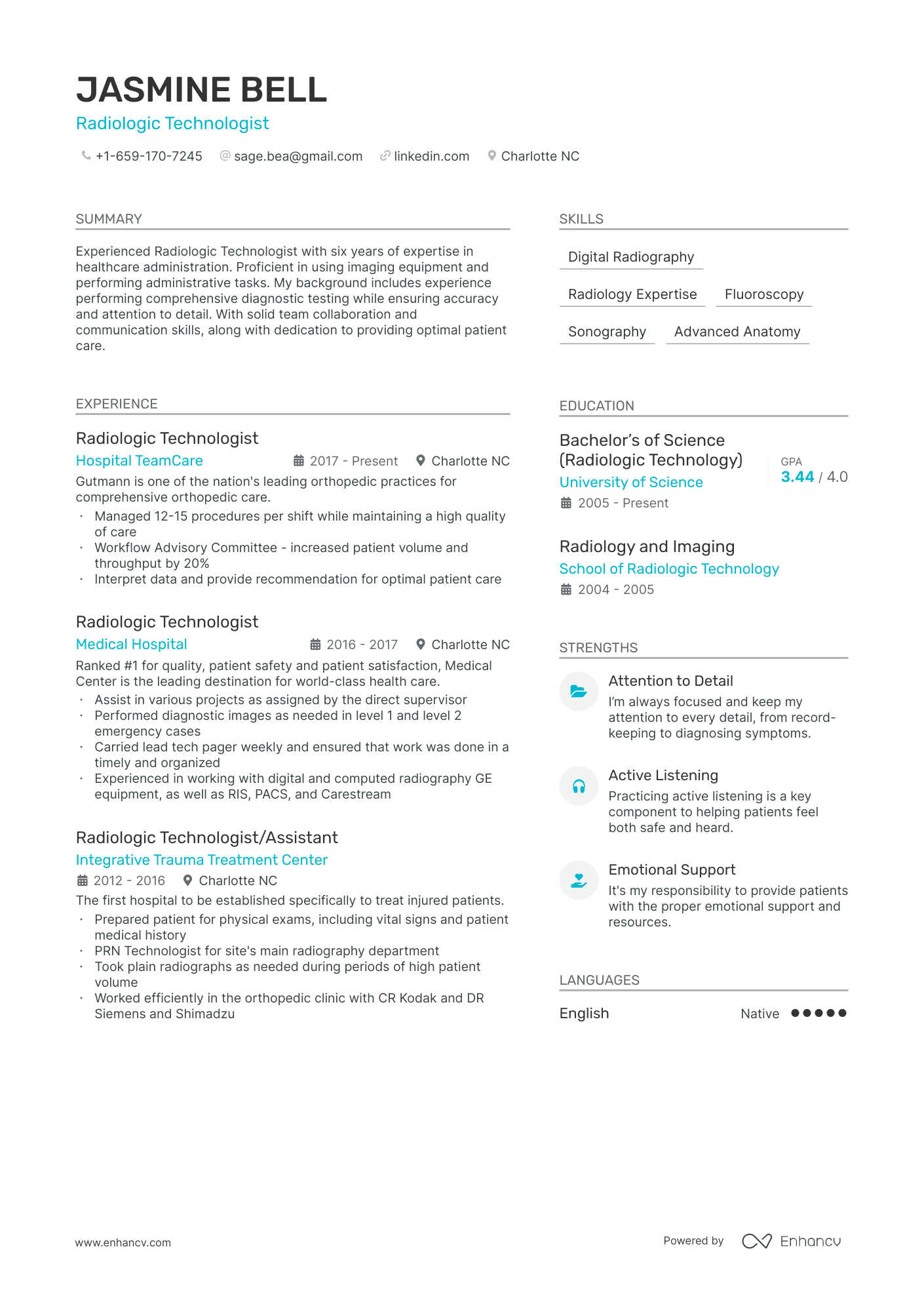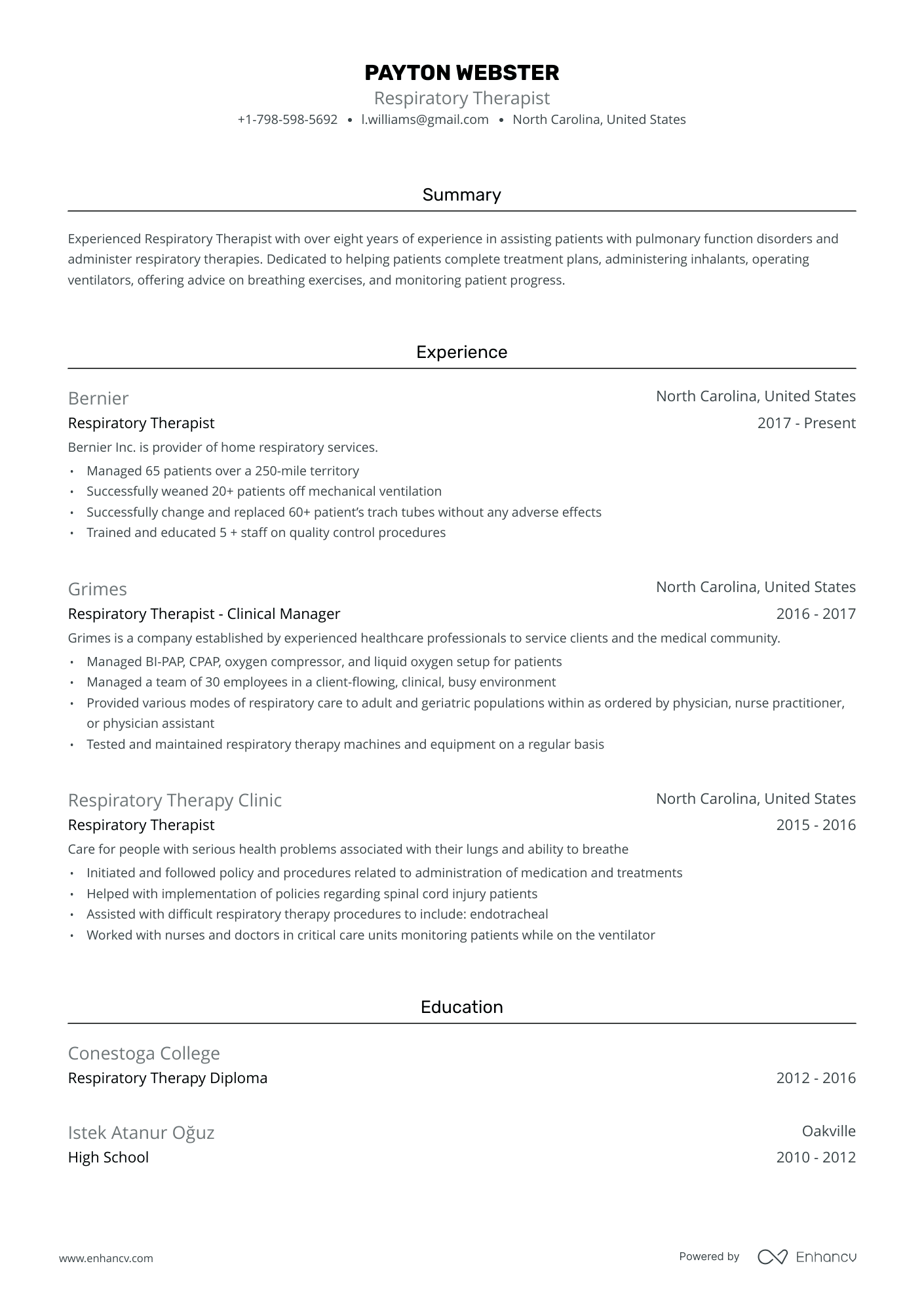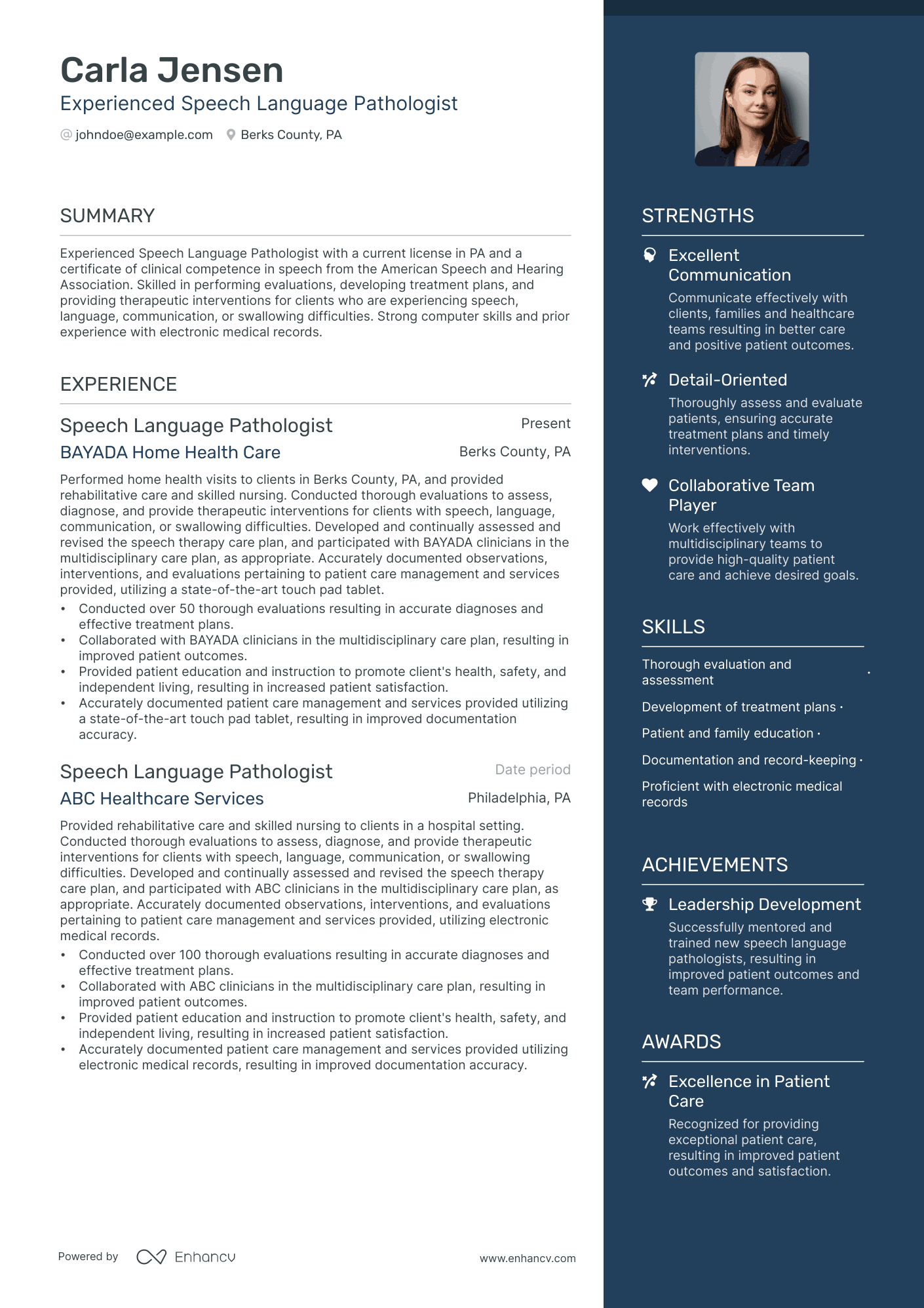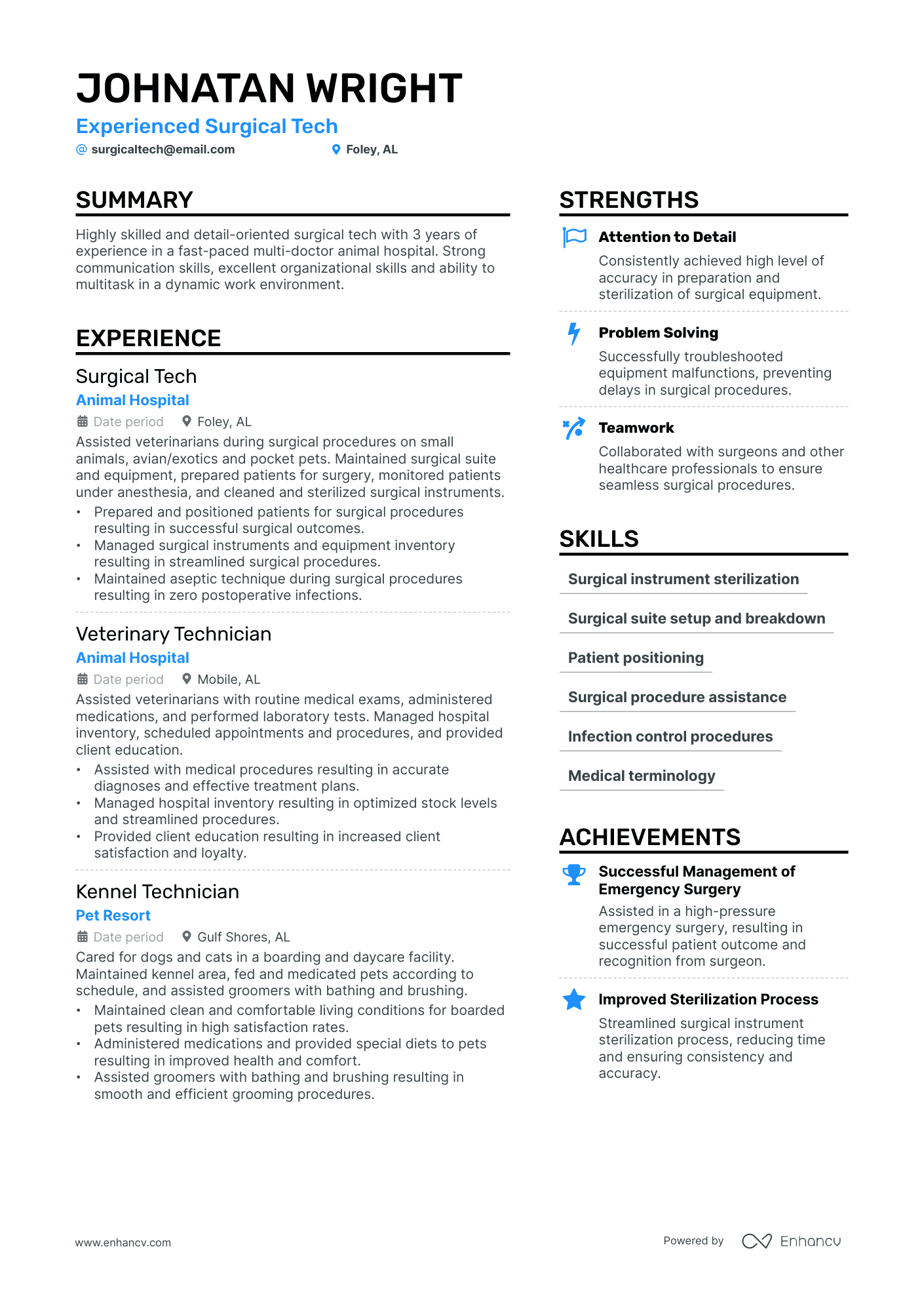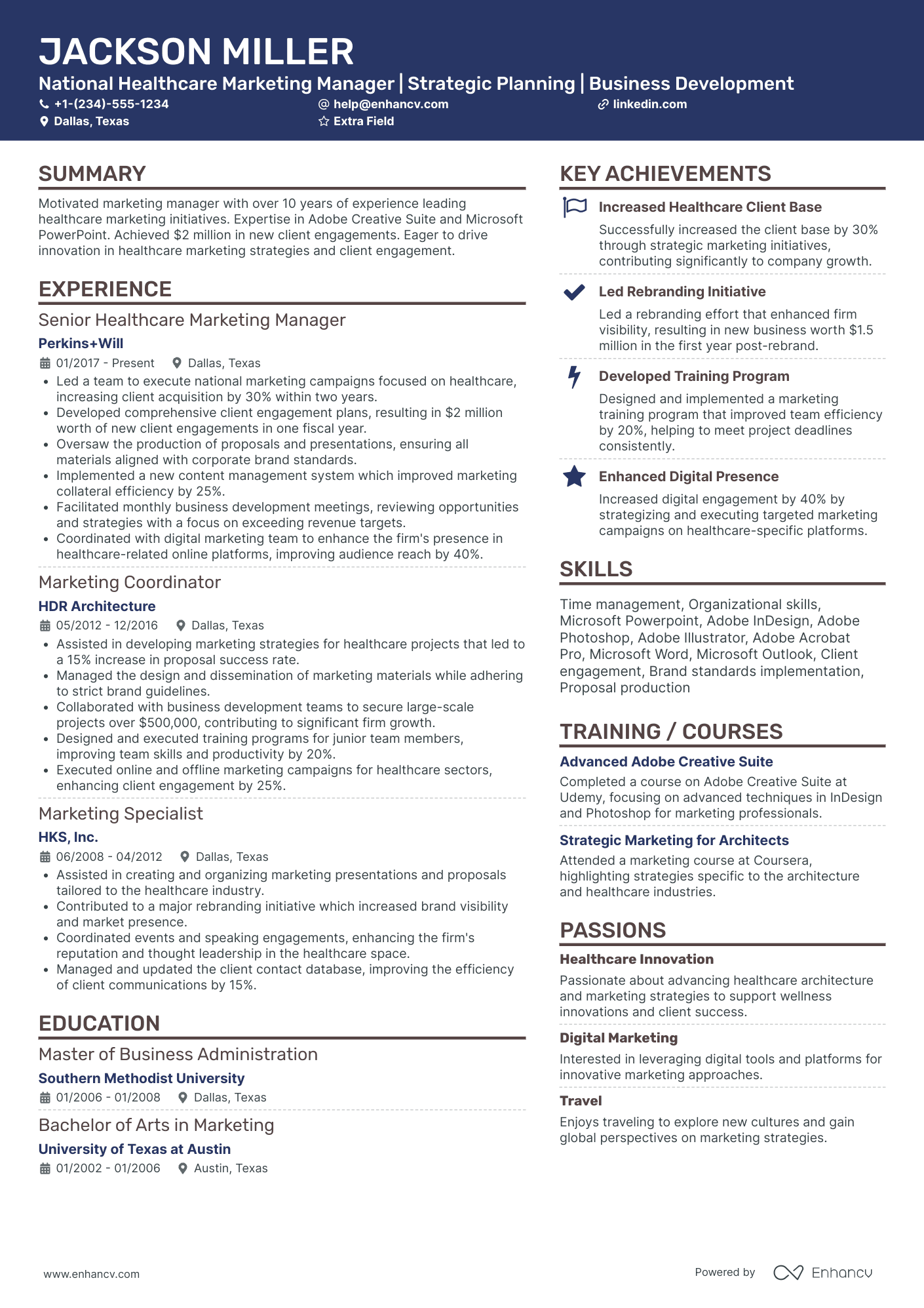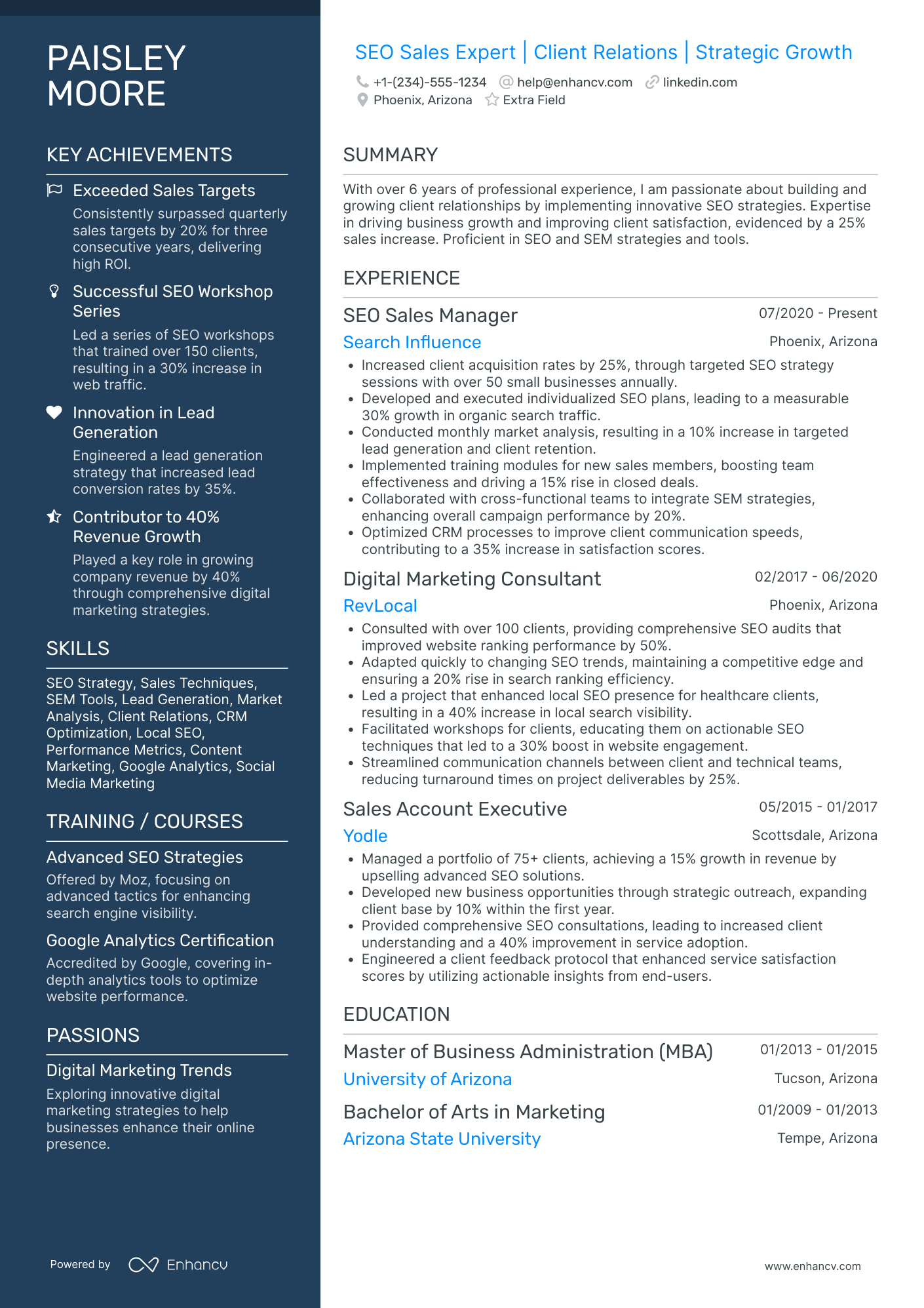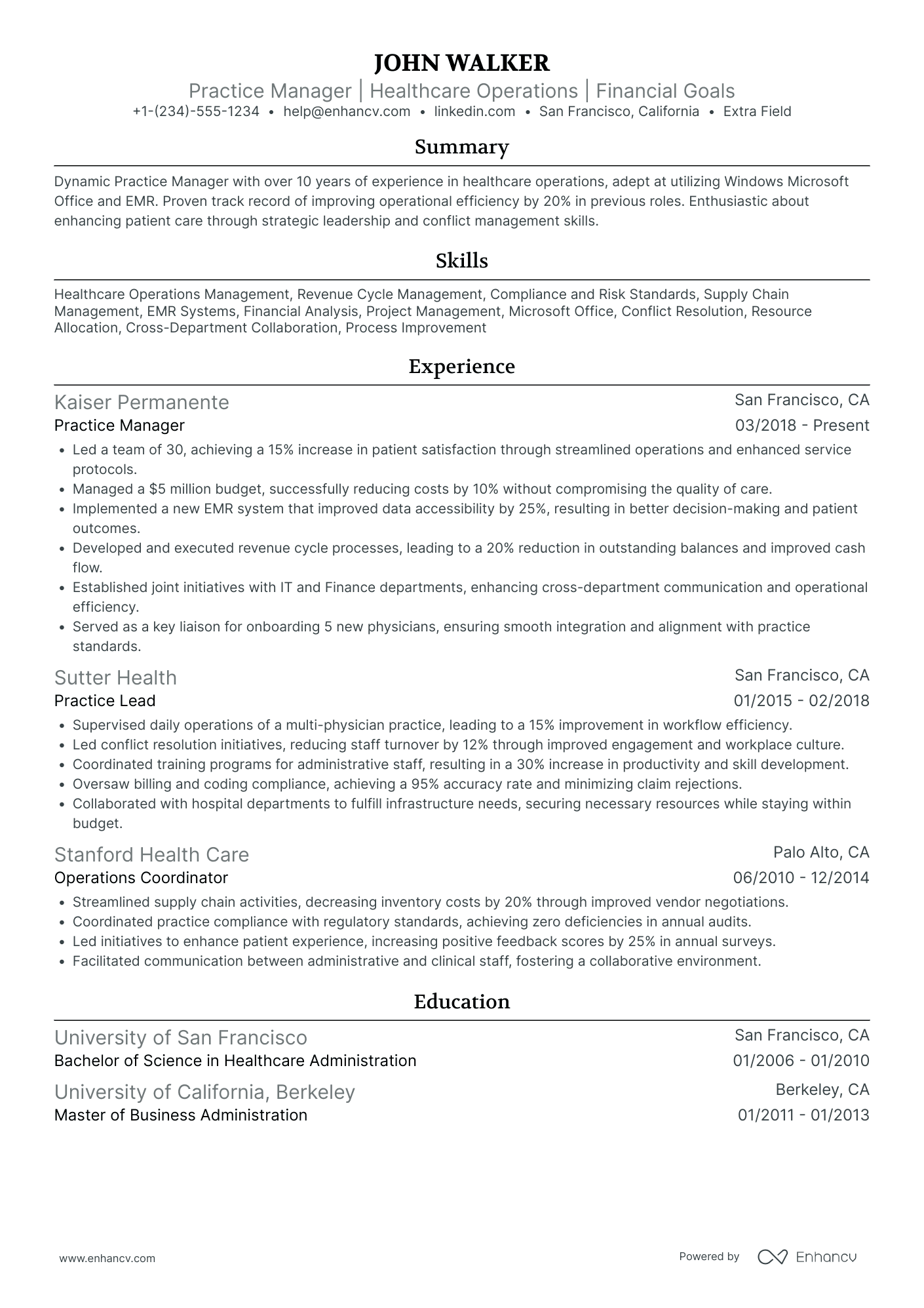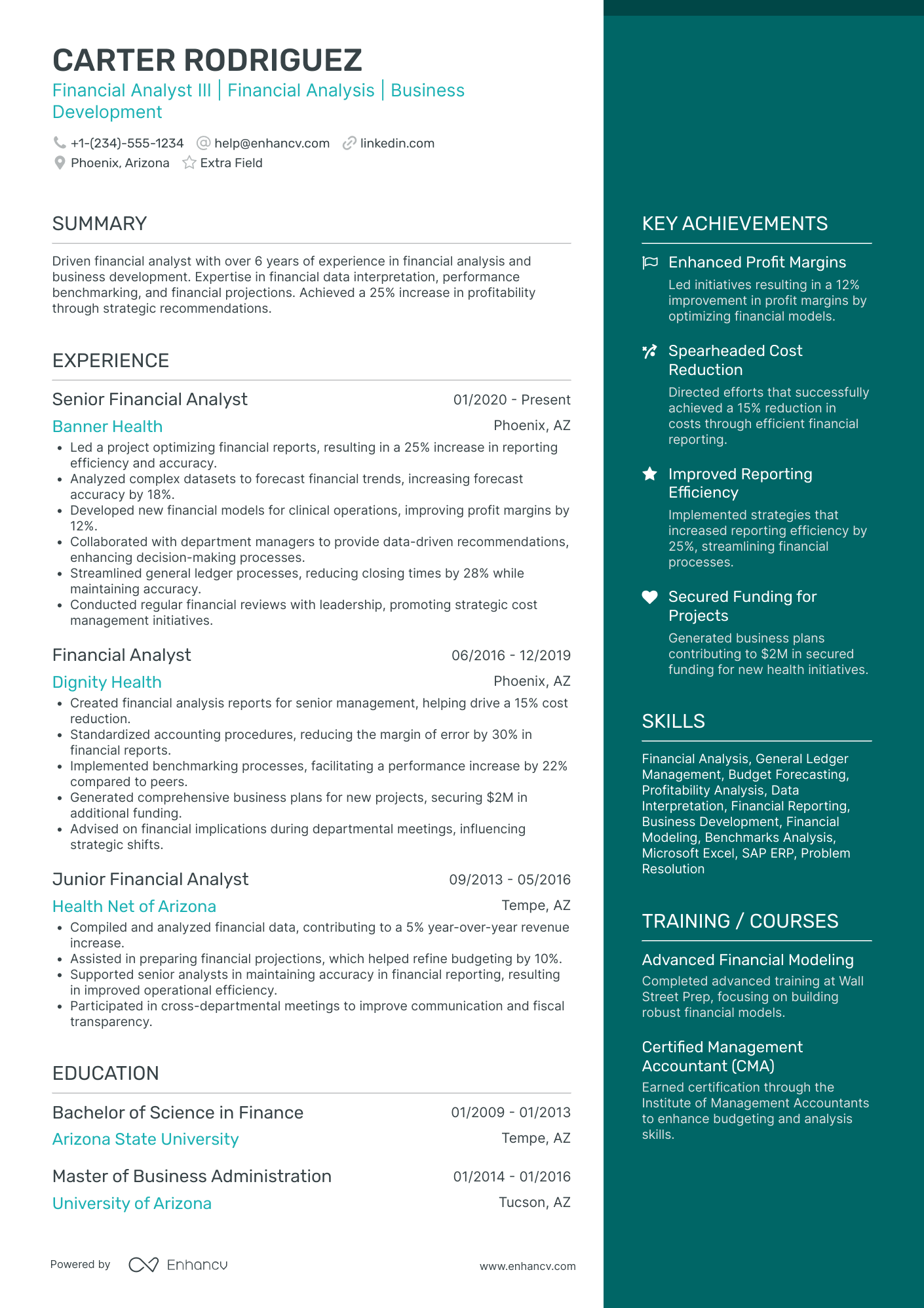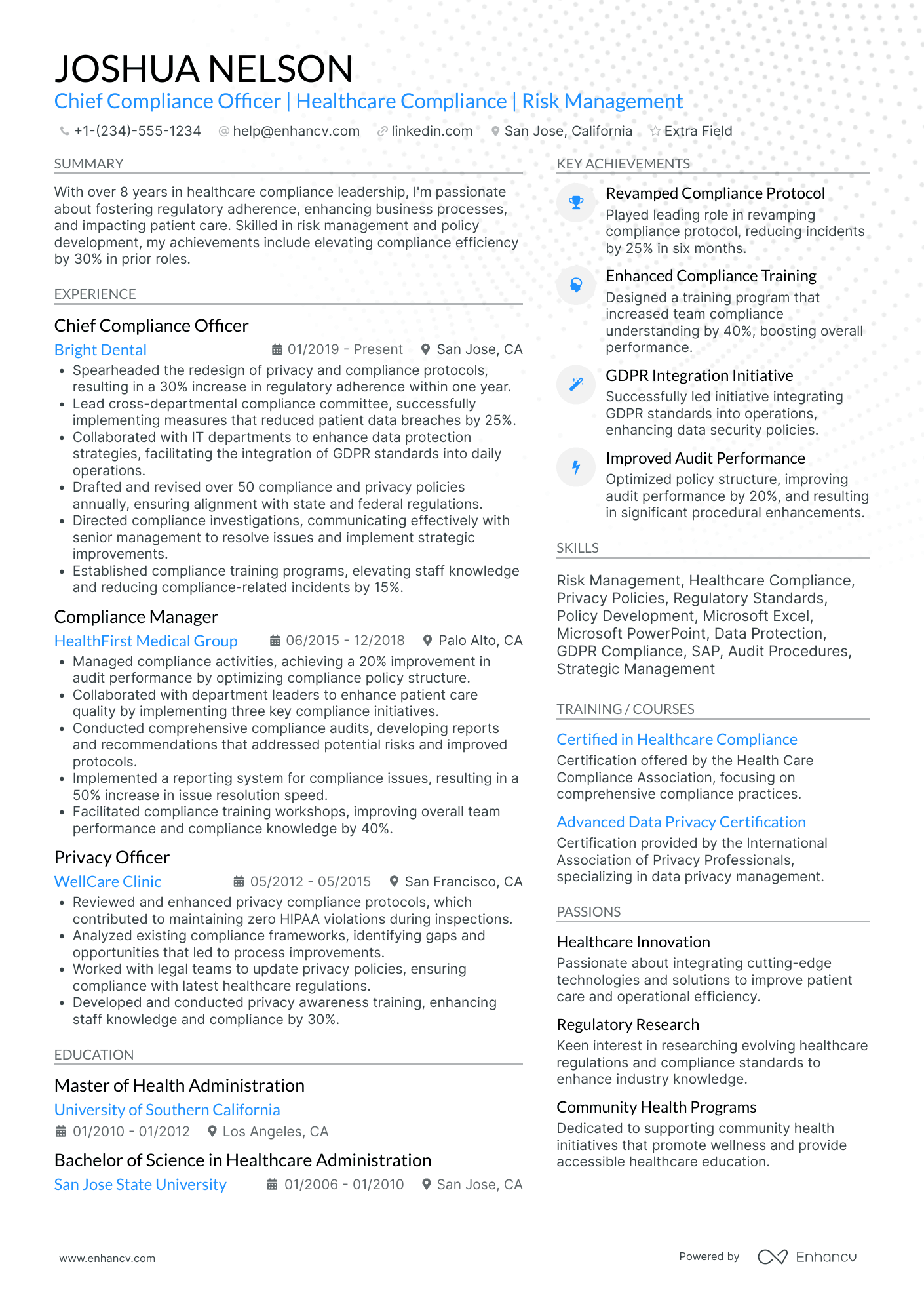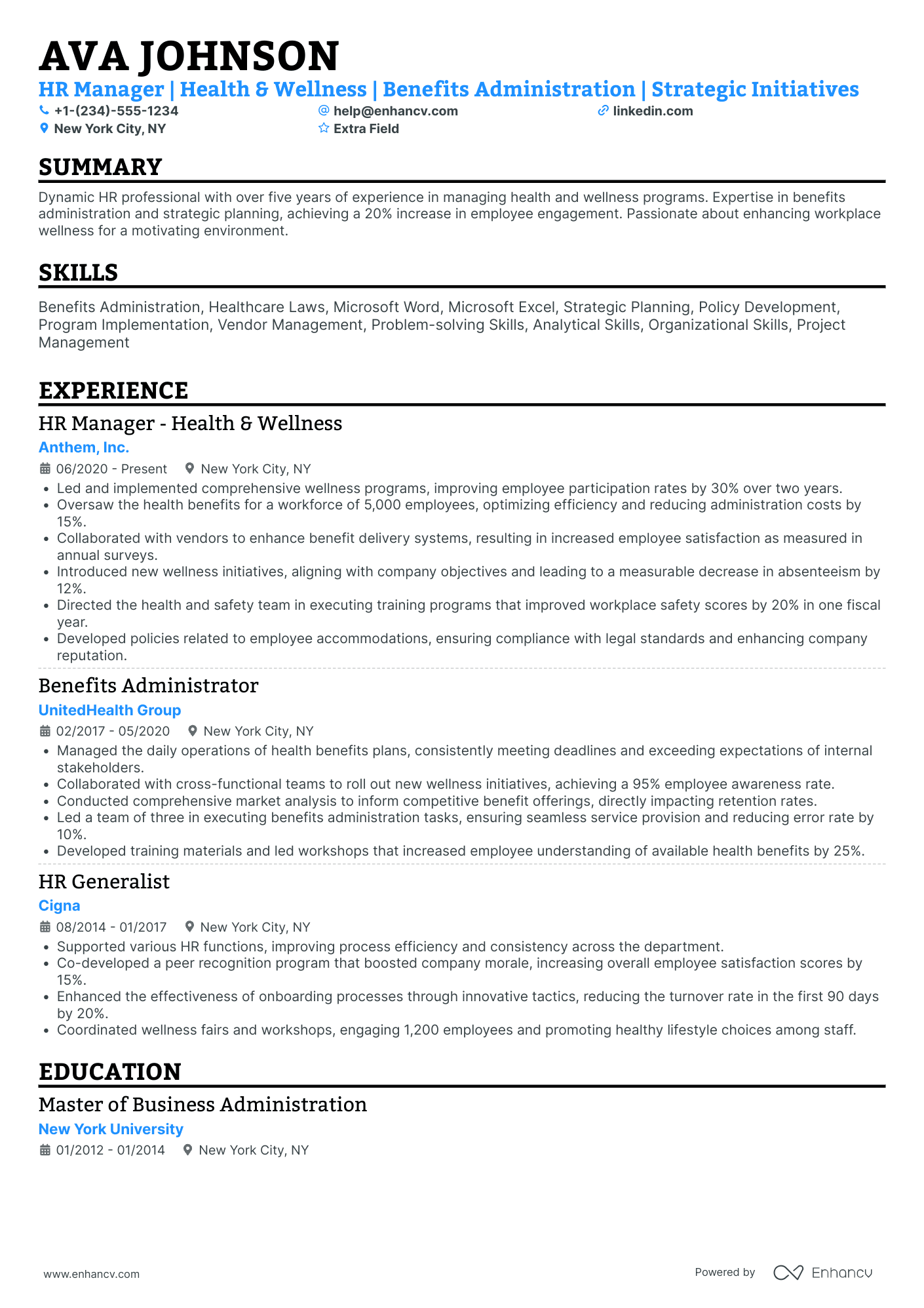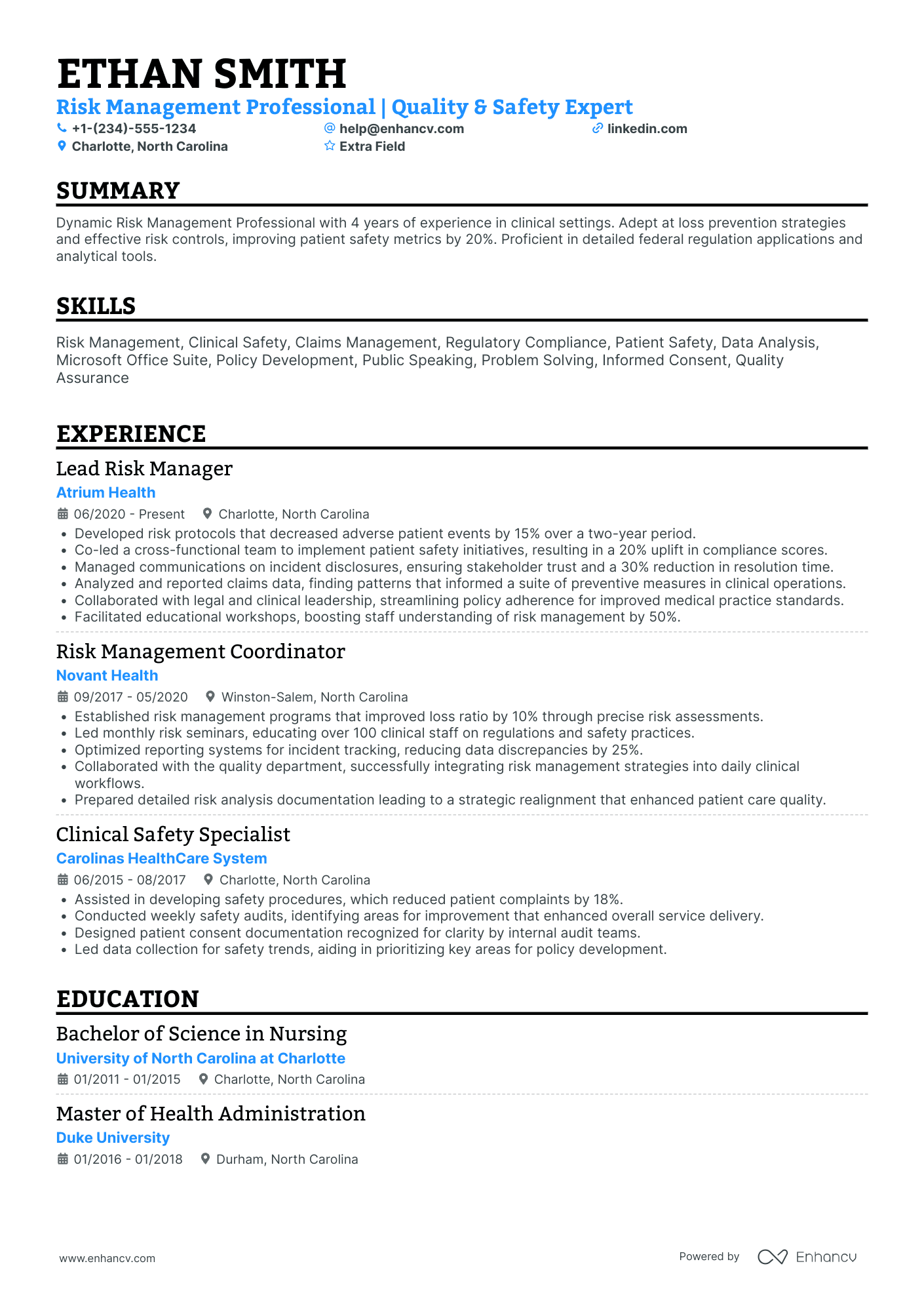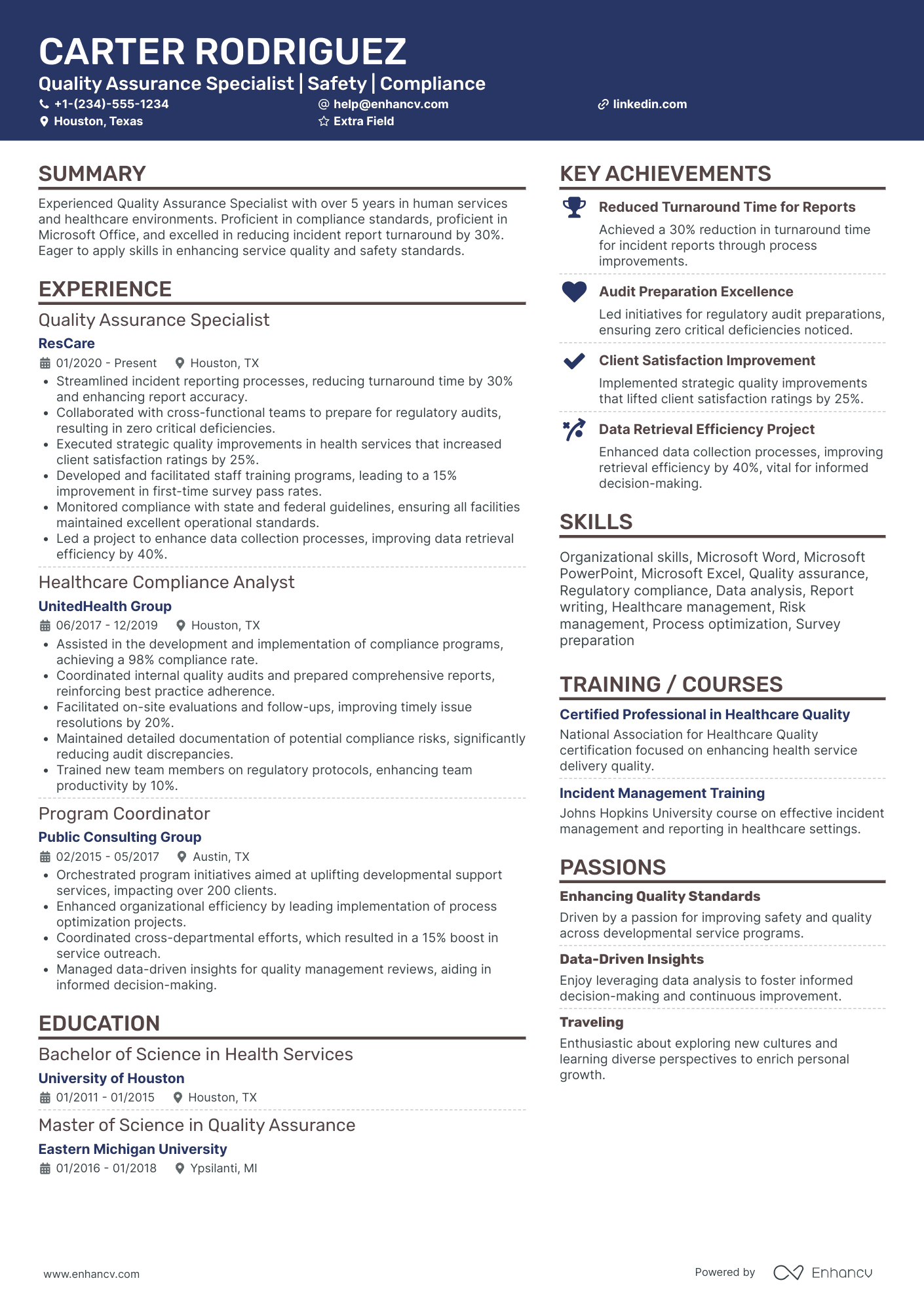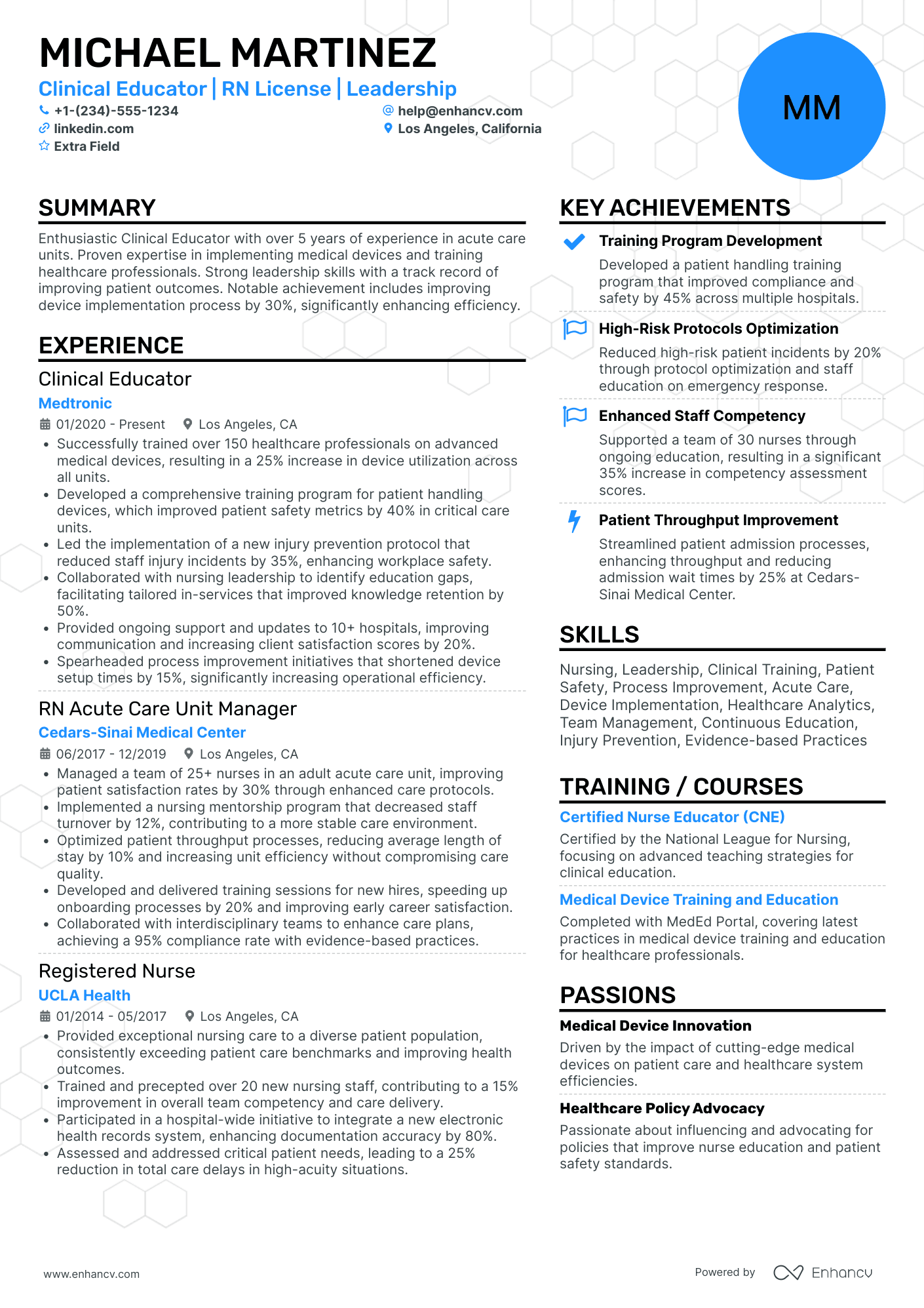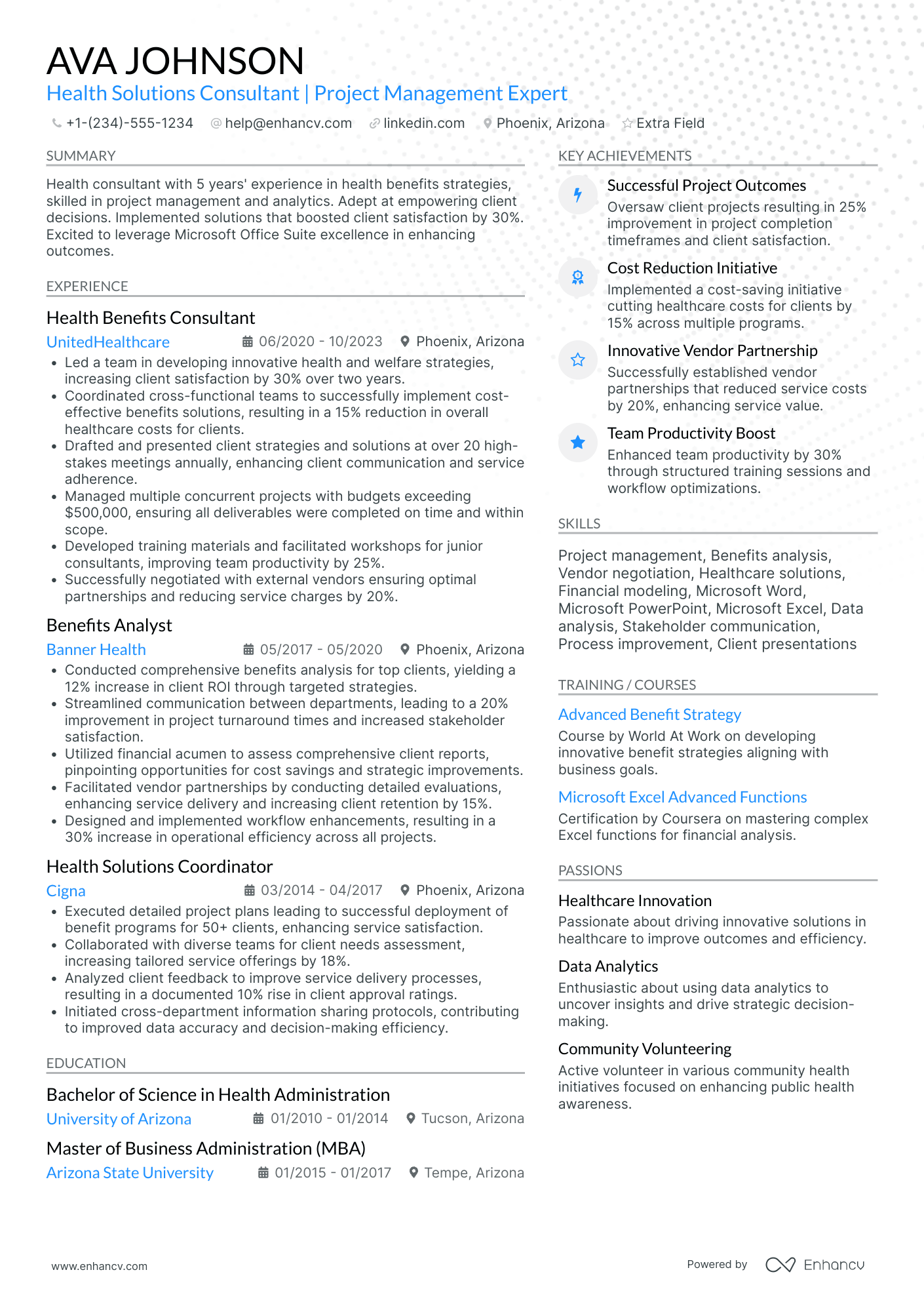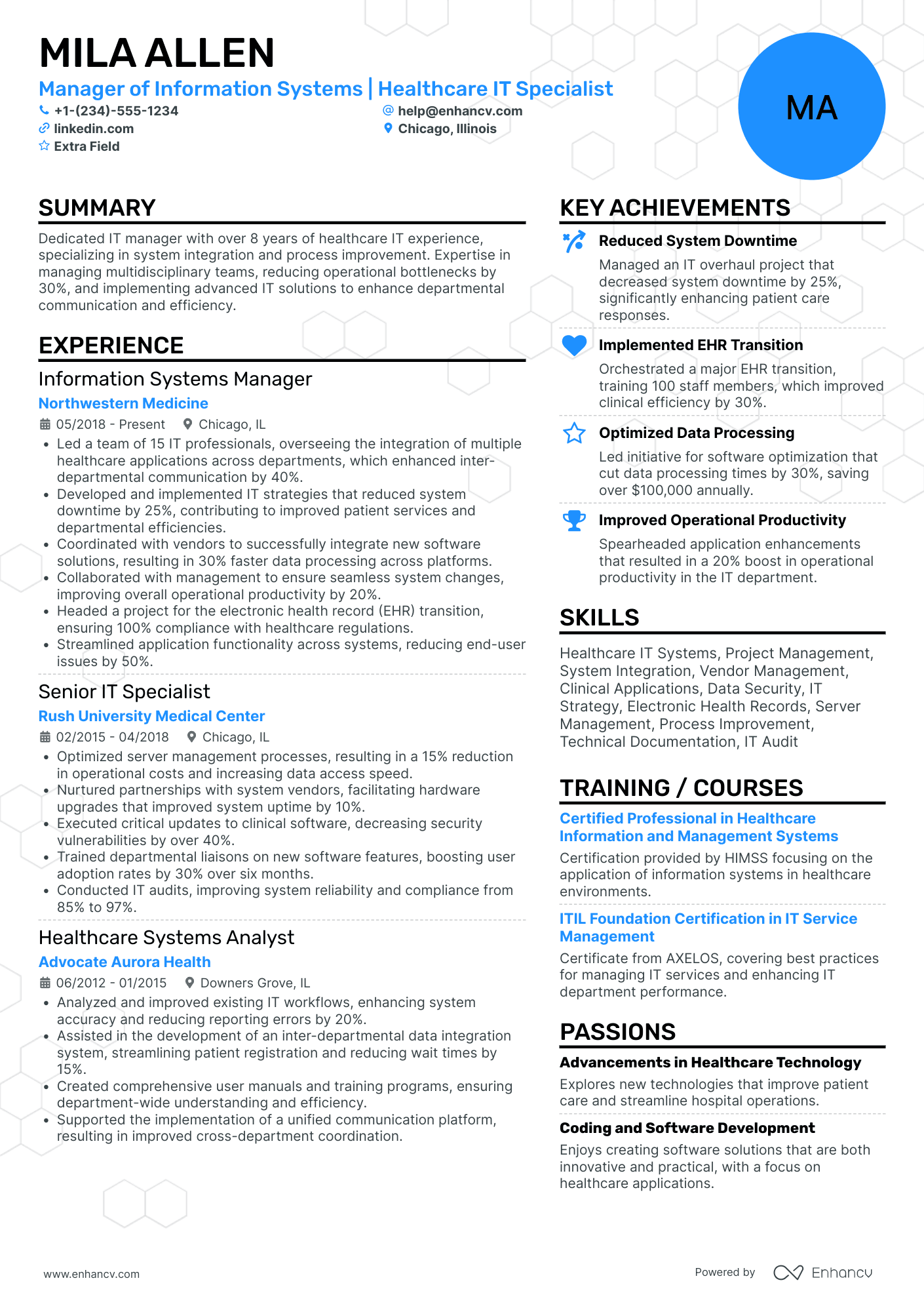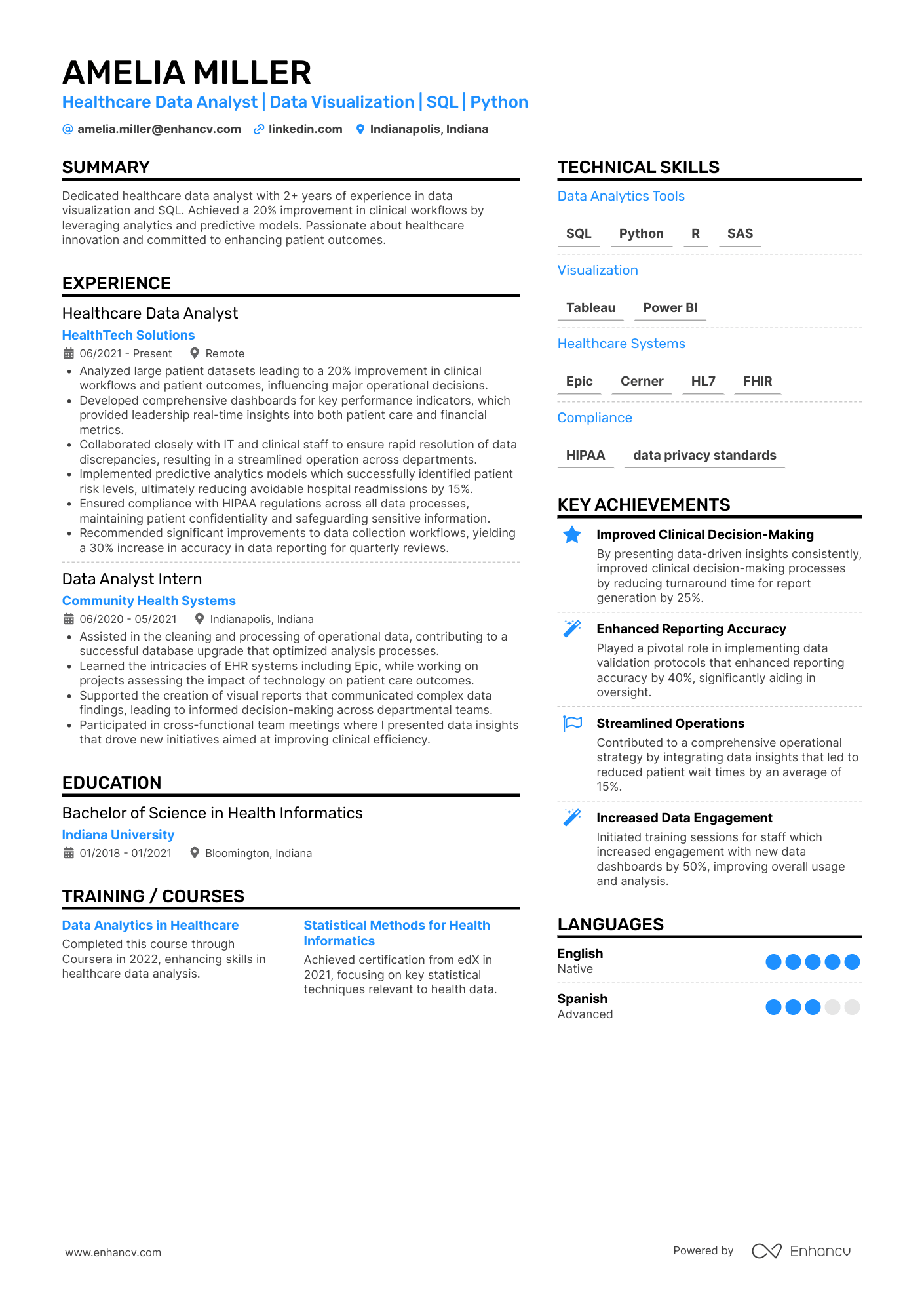Writing a good healthcare resume is all about showing competence and impact. What are your qualifications? Did you improve patient outcomes? Have you streamlined any care processes? How did you support organizational goals?
It doesn’t matter if you’re applying to a public sector hospital, a private clinic, or an exciting telemedicine startup. This guide will help you craft an application that goes past applicant tracking systems (ATS) with ease and makes hiring managers want to talk to you.
Healthcare resume sample
Here’s a sample you can edit directly in the Enhancv Resume Builder. It’s structured and written in a way that quickly shows recruiters the value the applicant brings to the role.
What truly makes this resume stand out is its content. The candidate demonstrates a clear grasp of the healthcare sector and the role, supported by numbers.
The summary, experience, and achievements sections are packed with quantified achievements, such as:
- Improvement in clinical workflows by 20%.
- Reducing avoidable hospital readmissions by 15%.
- Enhanced reporting accuracy by 40%.
- Increased engagement with new data dashboards by 50%.
Meanwhile, the work history and successful outcomes support the skills section, which groups the applicant’s technical abilities together. This further enriches the document with relevant keywords and industry terminology, giving the candidate an ATS advantage.
In case you’ve already built your healthcare resume, you can put it to the test with Enhancv’s free ATS Checker. It’ll review 19 key points and offer you improvement suggestions right away.
Is your resume good enough?
Drop your resume here or choose a file. PDF & DOCX only. Max 2MB file size.
How to write a healthcare resume
Here’s a step-by-step guide to creating an industry-relevant resume that healthcare hiring decision-makers look for, and that prompts interview invitations.
1. Pick the right resume format
The structure of your content is important—it dictates how you’ll present your patient care achievements, clinical expertise, and professional qualifications. Choosing the best resume format for your application depends on your level of experience and the specific healthcare role you aim to land.
Here are your options.
Reverse-chronological resume format
In a reverse-chronological resume, the focal point is your direct experience, starting with your most recent role and working backwards. This way, hiring managers can immediately see your career progression and clinical impact.
Use this format if you’re a:
- Doctor
- Therapist
- Registered nurse
- Physician assistant
- Healthcare administrator
- Healthcare operations manager
Functional resume format
If you have the necessary healthcare qualifications and abilities for the role but no on-the-job experience, then a functional resume fits your profile. It leverages your training, skills, and even your motivation.
Use this format if you’re a:
- Recent graduate
- Student or intern
- Volunteer transitioning into paid roles
- Certified professional without hands-on experience
Hybrid resume format
A hybrid resume uses elements from the other two formats. It works well if your work history includes relevant experience, but you need to present specific skills or achievements more prominently.
Use this format if you’re:
- Undergoing a career change
- Returning to the field after a career break
- Standing out with unique strengths (like rare skills)
Healthcare resume length
Ideally, a healthcare application should be one to two pages long. If you’re in the early stages of your career or a transitioner, then you should be able to fit your most relevant information into a one-page resume.
However, if you have over 10 years of experience and a longer work history benefits the role, you can confidently apply with a two-page resume.
Save your resume as a PDF. Our resume builder does this by default to preserve the layout and ensure ATS compatibility.
Recruiters often skim resumes before they give them a deeper read.
Here’s how you can make their job a little easier and shift their attention to what makes you a relevant candidate.
Present your healthcare competencies in must-have resume sections
- A professional summary tailored to the role quickly points to your qualifications and impact.
- License, education, and certifications immediately prove you’re qualified for the role.
- Healthcare experience details hands-on clinical procedures or industry involvement.
- Key skills prominently list your clinical and technical capabilities aligned with the job description.
- Clinical rotations or volunteering (optional) can reinforce direct experience and passion for the field.
2. Write a work experience section that shows impact in healthcare
There are hundreds of roles in the healthcare sector and their duties can vary widely. However, hiring decision-makers in the field are well aware of each role’s main duties. What they really want to see on your application is how you made a difference.
When outlining your healthcare experience, aim for three to five bullet points beneath each role. But here’s what really matters—focus on specific outcomes that show your impact on patient care and operational efficiency.
Whether you’re a nurse improving patient satisfaction scores, a physician optimizing treatment plans, or a healthcare administrator streamlining workflows, a steady career path backed up by quantifiable achievements is what will set you apart from other candidates.
Think about:
- What goals did you achieve?
- What challenges did you face?
- How did your actions improve patient outcomes, safety, or efficiency?
Here’s what something like this looks like in practice.
Good example of a healthcare resume experience section
- Delivered high-quality patient care to 40+ patients daily, achieving a 98% patient satisfaction score through personalized treatment plans and compassionate communication.
- Reduced hospital readmission rates by 25% by implementing improved discharge instructions and coordinating follow-up care with physicians.
- Administered medications and treatments with 100% accuracy, ensuring strict compliance with safety protocols and hospital standards.
- Collaborated with a multidisciplinary team of 15+ healthcare professionals, improving care efficiency by 30% and enhancing patient recovery outcomes.
So what makes this experience section impressive?
To begin with, the candidate talks about their experience using measurable data. In other words, they’re not just saying they’re competent—they’re showing it. This builds credibility and trust.
Additionally, the applicant effectively hints at their soft skills—they’re compassionate, caring, and collaborative. These qualities are valuable in a healthcare setting and remind recruiters that behind the numbers, there’s a real person.
The same best practices apply when listing projects on your resume. You can apply this approach to your own content.
Use specific metrics to make your healthcare resume experience section quantifiable
By reading the job description carefully and finding keywords, you should be able to pinpoint the metrics relevant to the specific healthcare role you’re targeting.
Some include:
- Number of patients treated or supported: “Provided direct care to 35+ patients per shift in a high-volume ER.”
- Patient satisfaction scores: “Improved patient satisfaction ratings by 28% through personalized care strategies.”
- Operational efficiency: “Reduced average wait times by 22% by streamlining triage workflows.”
- Clinical program success: “Led diabetes education program that improved treatment adherence by 18%.”
- Team leadership: “Supervised a team of 10 RNs and medical assistants, increasing care coordination efficiency by 20%.”
- Cost savings or budget management: “Managed a $1.5M annual department budget while lowering supply costs by 15%.”
Using numbers on your resume wins you all kinds of candidacy points, but overdoing it could backfire. So instead of listing every possible achievement in your career, focus on the ones that are most important to the role.
3. List your most relevant hard and soft skills
When targeting a specific healthcare role, it’s best to tailor your skills section to the job description. This increases your likelihood of passing ATS screenings and quickly shows recruiters you possess the necessary skill set.
You can list technical and hard skills both in a dedicated section and within your work history.
Best hard skills for your healthcare resume
- Patient assessment & clinical evaluation
- Electronic Health Records (EHR) management
- Medication administration & dosage calculation
- Diagnostic testing & result interpretation
- Treatment planning & care coordination
- Infection control & safety protocols
- Telemedicine platforms & virtual care tools
- Medical coding & billing knowledge
- HIPAA compliance & regulatory standards
- Emergency response & critical care procedures
- Surgical assistance & pre/post-operative care
- Health data analysis & reporting
Including healthcare hard skills that you don’t actually possess is a grave mistake. Those can be easily verified. Besides, the field is heavily regulated across the U.S., and the rest of the world, so lying on your resume can tarnish your reputation and have legal consequences.
Meanwhile, soft skills like empathy, teamwork, or patient communication are also important (as we mentioned above), but it’s best to weave those into your Summary, Experience, or Achievements using real examples.
Best soft skills for your healthcare resume
- Written and verbal patient communication
- Empathy and active listening
- Leadership and team coordination
- Critical thinking and problem-solving
- Time management and prioritization
- Collaboration with multidisciplinary teams
- Attention to detail and accuracy
- Stress management in high-pressure environments
4. Highlight your licenses, education, and certifications
Many healthcare roles require a license and formal training, so featuring those prominently in your education section and detailing them accurately is critical. This helps with AI screening while also reassuring recruiters that you’re legitimate.
If you hold multiple healthcare licenses, prioritize the most relevant ones. Then list your education.
Good example of listing training and education on a healthcare resume
Registered Nurse (RN), License #123456
California Board of Registered Nursing (Expires: June 2026)
Bachelor of Science in Nursing (BSN)
University of California, San Francisco
Graduated: May 2022 | GPA: 3.8
Relevant Coursework: Pathophysiology, Advanced Patient Assessment, Pharmacology, Evidence-Based Practice
Some healthcare roles, such as Certified Nursing Assistant (CNA), Emergency Medical Technician (EMT), and Certified Pharmacy Technician (CPhT), also require mandatory certification. If you fall into any of these categories, then squeeze your certificate between your license and education.
There are healthcare certifications that aren't mandatory but are nationally recognized and often preferred by employers.
Top U.S. healthcare certifications (highly in-demand)
5. Craft a resume summary that makes you stand out
Write your healthcare summary section after you’re done outlining your experience, formal training, and skills. This way, you’ll have a clear overview of your achievements and abilities. Mention the ones most relevant to the role you are targeting.
Good example of a healthcare resume summary
Patient-focused Clinical Care Coordinator with 7+ years of experience bridging the gap between medical teams, patients, and administrative processes. Passionate about leveraging data-driven care planning and electronic health record (EHR) optimization to improve patient outcomes and streamline workflows. Recognized for reducing care delays by 30% through proactive coordination, cross-department collaboration, and implementation of telehealth solutions.
Optimize your healthcare resume summary for ATS
Drop your resume here or choose a file.
PDF & DOCX only. Max 2MB file size.
Additional tips for building a strong healthcare resume
Small design choices can make any healthcare resume more appealing.
Right now, you might be wondering:
What font, colors, and template design should I use for my healthcare resume?
When creating your healthcare resume:
- Opt for a clean, professional resume template to reflect your credibility as a healthcare professional.
- Easy-to-read fonts like Rubik, Arial, and Calibri, set to 10-12 points, offer clarity.
- Set margins from 0.5 to 1 inch on all sides for a neat, focused appearance.
- Accent colors like navy, gray, or dark green can make your document pop out without distractions.
- Include your full name, phone number, and professional email address.
- Avoid adding a photo unless the job posting specifically says you should.
- LinkedIn is optional, but it can be used for verifying your credentials.
How do I write a healthcare resume with no experience?
If you’re a healthcare professional who’s just starting out, remember that your formal training already carries enough credibility. Leveraging your passion for the field is another great starting point.
Here’s what to focus on when building an entry-level healthcare resume:
- Start with practical engagements: Mention any internships, clinical training, or shadowing experiences. These provide tangible proof of your readiness to work in a patient-care or healthcare-support environment.
- Detail your education: Healthcare courses, clinical rotations, and certifications establish your foundation.
- List any non-formal experience: Volunteer work, community service, or academic projects related to healthcare will absolutely count and demonstrate initiative.
- Outline general skills: Transferable skills like problem-solving, teamwork, and communication are valuable in any healthcare setting.
- Use an objective: Instead of a summary, write a concise resume objective that describes your enthusiasm for starting your healthcare career.
What additional sections can I include on my healthcare resume?
For healthcare roles, emphasize both clinical expertise and soft skills by including these additional sections in your resume:
- Professional Affiliations: Membership in healthcare organizations shows engagement with the community.
- Publications & Research: Academic or specialized roles benefit from such contributions to the field.
- Conferences & Workshops: Ongoing professional development and commitment to staying updated on industry advancements.
- Awards & Honors: Prestigious honors help you stand out among similarly qualified candidates.
- Languages: Multilingual communication improves outcomes and accessibility in diverse patient settings.
| Role | Salary |
|---|---|
| Nurse Practitioner | $126,260 |
| Physician Assistant | $130,020 |
| Nurse Anesthetist (CRNA) | $212,650 |
| Medical and Health Services Manager | $110,680 |
| Veterinarian | $119,100 |
| Speech-Language Pathologist | $89,290 |
| Physical Therapist | $99,710 |
| Occupational Therapist | $96,370 |
| Respiratory Therapist | $87,530 |
| Psychiatrist | $239,200 |
(Source: U.S. Bureau of Labor Statistics)
Conclusion and where to go from here
A successful application in the healthcare sector requires both in-depth role understanding and presenting your qualifications and skills strategically. By crafting targeted resumes with Enhancv, you increase your chances of landing more interviews.
Here’s what you can do next:
- Choose a resume template designed to pass ATS and make your achievements shine.
- Find specific resume examples and guides for the healthcare roles you’re targeting
- Use our Cover Letter Builder to create a complete application package.
Your next opportunity in healthcare is out there—let Enhancv help you get there faster, with a resume that sets you apart.
